#i still think it’s a useful (if very flawed) tool but the functions no longer make sense in my mind
Explore tagged Tumblr posts
Text
I do wonder if my disillusionment in MBTI stems from a gap in understanding or if it is genuinely a flawed system…
#i still think it’s a useful (if very flawed) tool but the functions no longer make sense in my mind#(tho also idk how to explain it but while i don’t think it has no merit at all… i think because of its flaws its not reliable and is pretty#harmful… important to consider what with its growing prevalence)#definitely never thought it as more than pop psychology but there was room to argue about it being feasible#but not really anymore#evie rambles
3 notes
·
View notes
Text
just read that article from new york magazine, "Everyone Is Cheating Their Way Through College - ChatGPT has unraveled the entire academic project."
didn't reveal anything new to me about the use and functioning of the plagiarism-grown, glorified auto-predict, language models that were rolled out so irresponsibly it means now anyone can waste water instead of their own time and effort. but was still fascinating to read, in a bleak way.
it's so interesting because cheating and corner cutting will always exist in education, whether out of desperation or laziness, it will always be there. but by university it truly is wild how many people are not actually there to learn, because at that point if you have a program do all your work for you you are fully not there to learn so why waste your time and money playing pretend at a degree. a degree you aren't qualified for because you did not do enough.
we aren't in a post-capitalist universal basic income world where the idea of a few individuals lightly supervising automation is feasible. the technology is not there and the culture and economic stability is not there. so when a professor in the article reasons to students “you’re not actually anything different than a human assistant to an artificial-intelligence engine, and that makes you very easily replaceable. Why would anyone keep you around?” that is not hypothetical. and in terms of the degrees just because the on paper grade says you passed doesn't mean you passed it means you curated automated responses that pass with no actual guarantee of comprehension or retention of information on your part.
and there are tools and templates and minor automations that can be used to supplement your own efforts! they take longer but not that significantly, and more importantly they are less likely to impede the actual practice of learning to implementation.
that's what a lot of people who cheat or use these tools in this way seem to miss.
let me pull out three paraphrased statements of possible justifications from this article:
The education system is flawed
These exercises are irrelevant
I'm bad at organisation
these are all experientially true to my experience of education at various points. and the first point exacerbates issues with 2 and 3 to where students can feel overwhelmed or underprepared or frustrated for various reasons. however where i differ personally from the choice making of these students, is that while i never had access to such a powerful tool i still never chose to cheat or cut corners with things like chapter summaries instead of reading a book, or getting someone else to write for me, or any other obvious forms of cheating/plagiarism.
and the reason for this is not lack of frustration or feelings of antagonism towards the system or confusion over content or lack of organisation skills (all issues i had). it's that throughout my education, i am talking back to primary school, i always tried to figure out WHY we were doing the work assigned to us. what in our studies is it trying to get us to engage with, what methods does it force us to put into use to communicate that knowledge, and how much of the information have we comprehended and retained. some assignments are bad at the execution of these goals but if you can see what the goals are you can still benefit from attempting to achieve them while meeting the requirements enough to pass. IMPORTANTLY the process of doing this frustrating and often inefficient process helps not just critical thinking skills but also is how you actually learn things.
no one else can know stuff for you. it makes sense to outsource a basic sum to a calculator app on your phone, but this means you are not a mathematician. if you use a chapter by chapter summary to write a book report you have not read that book. if you read the wikipedia article for a movie you have not watched that movie. all of these are more verifiable sources of information than language models.
if you get a transcript of a lecture you did not attend and use a chatbot to make notes for you then you did not attend that class- if you read the transcript and take notes and then use the chatbot and compare the difference at least then you used your capacity for thought to process the information and assess it through comparison.... but it would be better to find a classmate and compare notes with a peer so you both have the opportunity to not only check how well you understood the lecture/refresh the information covered, but also a much lower stakes chance to try out communication skills than the group assignments and oral presentations often assigned for this purpose. and on top of that you get to socialise and network with someone in your field of study in a way that benefits both of you.
i'm not even against the use of machine learning models generally, i think they are useful in a repetitive task automation and data scanning context. but why are we delegating things like Knowing Stuff and Human Connection to the 1 and 0 machine that might as easily sell our info as have it leaked to hackers. what kind of cyberpunk surveillance dystopia are we shrugging lazily into? you do not have to pay all that money to pretend to be a competent professional. and if that sounds harsh it's because it is. there are enough scammers and barely qualified people succeeding in this world.
you do not have to dedicate your life to labours that you are not capable of, at the very least be honest with yourself of your own capacity for thought and action. genuinely try to figure out if you are using this technology because of a 'can't' or a 'won't'
it's not a tool if it knows more than you- it's a tool if you could do the job without it.
24 notes
·
View notes
Text
Wonder Woman and Letting Go
I rewatched Wonder Woman recently, and first of all, it's such an excellent movie, and I appreciated it even more on my second watch. This time I watched it while also thinking about star wars, because I am always thinking about star wars right now, and I had some new thoughts.
Steve
After he finds Diana when she believes she's just killed Ares, Steve clearly wants to stay, sit down and argue with/explain to Diana so they can go do things together, and so she won't see him as one of the corrupted people, but he lets go of both of those desires, so that he can go and have a chance to stop the gas from being deployed.
He doesn't stop caring about her or believing in her in the least, but he's able to function despite his disappointment and hurt, not letting them rule him.
Ares
Ares sees humanity's imperfection, and he cannot accept it. He cannot prioritize anything except his mission to destroy them, even for a minute. He feels betrayed by his father's attentions to humans and the way his world changes when they inhabit it, and he seeks vengeance, unable to even decide to avoid/ignore humans or try to find any good in them. He kills his whole family in his bitterness and anger, and then spends presumably centuries on Earth, among the humans, and he is still utterly unable to look past his feelings to find anything good in them. Even faced with Steve, a human selflessly trying to do good, nothing like the awful politicians he spends most days with, he is unable to see that good as anything other than a tool to manipulate Steve and Diana with. He tells Diana that Steve is weak and cruel for dying and leaving her in pain, while she is able to see his choice as incredible strength and true selflessness.
Diana
After she sees the plane blow up with Steve on it, Diana is overwhelmed by rage, and for a minute, it seems to empower her, helping her fight. But very quickly, it becomes evident that Ares is controlling every aspect of the fight. She loses ground every second she stays in that state. She very nearly does decide on destruction, because of how overwhelmed she is by grief. It's only after she figures out what steve was saying to her that she finds the strength to appreciate the purpose of his sacrifice, over her pain at losing him. She repeats his words, "It's not about deserving, it's about what you believe," taking the best of what he gave her, and honoring both his wish that she save the world and her own desire to help people. She can only do that by letting go of her pain.
Diana still mourns, still remembers him. Her love for him still exists, it's a part of what inspires her to do good in the world. It isn't the pain of losing him, or a desperation to avoid more loss that drives her, those things would make her destructive to herself and others, or unable to act at all. It's the light she saw in him, and her own moral backbone that have her helping people, forever. Pain may have been a part of that journey, but it's not what helps her honor Steve or herself, or humanity, so she lets it go. If you understand why she chose not to hulk smash Dr. Maru (Dr. Poison), then you understand letting go of pain and vengence.
In a more general sense, she does what Ares refuses to, and she lets go of her desire for perfection. When she does, she doesn't lose her outrage at their cruelty, but she is no longer tortured by it, no longer trapped in inaction or driven toward destruction. In letting go, she's able to see clearly where her naive faith blinded her before. If she'd still been clinging to that, then after she actually killed Ares, she would've still been hoping everything was suddenly fixed--but she doesn't. What she does do, what the camara tells us the audience to do, is open our eyes to the simple camraderie of the flawed people around her, and its worth.
In conclusion
This has been a spot of character analysis through the lens of jedi philosophy (i'm not saying it's the only lens to look at these characters with, but it is a powerful one). Letting go of pain, anger, grief, people and things we cannot get back, are things every human has to do at some point. The Jedi practice doing this before they actually lose the thing, so that unlike with the situation Diana ends up forced into, it's not a toss up of whether they'll be able to do it in the moment. Like Diana, they hold great power, power they can't give up because it's in their blood, and like Diana, they learn to manage their emotions and personal desires so that they don't hurt people they don't have to. It doesn't mean they don't feel emotions or have people they care about, it means they don't allow these things to control them.
"It's not about deserving," or what you feel you and others deserve, "It's about what you believe."
Or, to take a page out of Spiderman's book, "with great power comes great responsibility."
7 notes
·
View notes
Text
durability in a vacuum often isn't necessarily a bad mechanic, but it can be bad when put into certain contexts, and can be good when put into certain contexts.
let's take minecraft, as an example. minecraft's durability system is bad, but i've come to believe that it's actually due to other mechanics that the system is truly bad. on a very basic level, losing all the durability in a tool breaks the tool, destroying it permanently. this tends to be an annoyance more than anything, because it's relatively inexpensive to just make new tools, especially with how common iron is. once you have access to a good cave, you're likely to amass a decent pile of diamonds as well.
of note here is that tools can be repaired in numerous ways. if you make multiples of a tool, you can combine their durabilities to repair them. you can also use an anvil to repair them with their base material - though this is only economical with armor, for unenchanted tools, it's better to just make a new tool. of note, however, is that the experience cost to use an anvil doubles for that tool each time you repair it, and if the cost goes over 40 levels, the anvil will refuse your repair. in this case, your only option is to bring the tool to a grindstone, which will clear its enchantments, but also reset its anvil cost. and, of course, the king of enchantments, mending. mending is an enchantment which uses dropped experience - not stored experience - to repair the tool as it's used.
within mending lies the fatal flaw of minecraft's durability mechanic. once you have access to mending, there is no longer any mechanic - durability is functionally turned off, especially for tools and weapons. in general, if a mechanic can easily be turned off through gameplay, there's a huge issue.
every game has mechanics to provide challenge for the player. one of the most common mechanics is the combination of health, defense, and damage reduction. these are all different terms that functionally refer to the same thing: how much damage can a player take before they die. there are multiple ways this idea can be worked on, the three most common being increasing the maximum health pool, reducing incoming damage by a flat amount, and reducing incoming damage by a percentage. in most games, there will usually be some kind of limit to how hard to kill a player can make themselves. most often, health increases give diminishing returns, damage can only be reduced to 1, or damage resistance caps at a certain percentage (80-95% is a common breakpoint range)
imagine, now, a mending-type enchantment for player health. you can still lose health, of course, but whenever you would gain experience with missing health, you instead regain a heart. in this way, it would be very, very easy to simply never die again - with a bow (enchanted with mending, of course), you can defeat any enemy functionally for free, only costing an inventory slot or two for ammunition. you can take damage from pillagers and skeletons and witches, sure, but you can just kill them and then you heal off whatever damage you took, if you even have any missing after saturation regeneration. by that same token, if the enchantment instead gave saturation, you would become functionally unkillable even in melee, as any damage you took would be immediately regenerated through natural healing.
that was an extreme example, of course, but it makes clear the problem - the mechanic can just be disabled. and this disabling isn't just a meta option - indeed, there is no game rule you can change to disable durability altogether - it's an in-game intended method of outright ignoring what actually has potential to be an actually interesting mechanic.
and i want to be clear, i don't think durability as a mechanic is necessarily bad. I've played games that have genuinely good durability mechanics. i just think in many cases, it doesn't make the game any more fun or interesting, and it's especially egregious when the developers agree and add a way to circumvent it, rather than either try to make it better or outright remove it.
actually i want to talk about a game that i think does durability very well. valheim.
in valheim, all weapons, armor, and tools have durability. dealing damage, using the tool, or taking damage reduces the durability of the relevant item. when an item runs out of durability, it's disabled, and you can no longer use it - in the case of weapons and tools, they can't be swung, and armors can't be worn. importantly, though, you never lose the item - it simply becomes useless dead weight until you can repair it. repairing an item, though, is free! the only requirement is that you're at a relevant workbench of a high enough level. this is a relatively small touch, but that single requirement heavily ties into and enforces the base building. repairing your items necessitates having a home to come to, or an investment into building an outpost to repair items far from home. durability in valheim acts less as a resource sink, and more as a timer on how long you can adventure from home and do your work; the longer you're out, the more wear and tear your gear picks up, and if you run out of durability and you can no longer swing your sword or your warm clothes get torn off, you go into panic mode because you need to get home or risk dying. this can be partially circumvented by carrying duplicates, but this comes with higher risk and lower returns: if you die, you risk more valuable things, and every duplicate item takes up a valuable inventory slot. with very careful play, one can simply keep repairing their stuff and never actually have to worry about it, and this rewards preparation - before you set out, make sure everything is in good condition lest you be forced to run home naked through the snow.
#candy rants#i have other examples of good and bad durability mechanics#you'll never guess how i feel about botw#but it's getting late and I'm getting tired#so if you want to hear me rant about any particular game's durability mechanic you can just send an ask and I'll respond
1 note
·
View note
Text
@htghgg No, this particular meme image is exactly what you are and exactly what you deserve. You've gotten so butthurt that half of your response is talking to yourself imagining what you think is "witty" comeback. You are like 16-19 because there is no way a grown, mature adult falls into such ABSURD levels of black-and-white thinking (saying that we are "shallow fanboys" and give "slavish praise" when we offer reasonable respect and assume we don't acknowledge ANY flaws just because there wasn't a disclaimer that we do), but personally I don't believe in being patient with someone acting obnoxious just because they are a kid.
"Explain why Irina's corpse doesn't despawn when she is resurrected as Hyetta by the Frenzied Flame."
Because... she doesn't? Like, cool headcanon on Irina and Hyetta being the same person, did your favourite lore Redditor get it for you? NOWHERE in the canon it is said that they are the same person. I, for example think it is obvious that they're separated twins like Devin and Darian. Devin is 'silver' and Darian is 'golden', so if two twins sharing soul means they are opposite, what is the logical "opposite" of seeking Two Fingers if not seeking Three Fingers? Discarding the twin that got the 'short end' sounds like something people in the Lands Between would do! Another thing: Hyetta might be not fully corporeal. Sellen, for one, is an example how whereas body and astral projection were separated, her astral projection looked and acted just like normal self without any spirit filter. Hyetta could be a similar thing, since physical and spiritual strangely blend in the Lands Between. Like.. precedent is right here.
Had it been confirmed anywhere that Hyetta is just resurrected Irina, then fine. But you can't use your headcanon as an arguement when not only Fromsoft allows room for interpretation, but you have at least two more logical explanations. Miyazaki leaving all tools for finding answer without stating anything is how he always goes. Again, obviously Elden Ring is your ONLY Fromsoft game.
Explain why MULTIPLE CHARACTER QUESTS where unfinished when the game releases, and even to this day A SUPERMAJORITY OF THEM, are easily breakable.
1) Again, like I mentioned before, they hadn't finished some questlines due to time constrains + some no longer fit their vision (like Reeling Rico's quest) 2) Maybe they think it is weird to just add what they haven't finished in due time later with big patch, but the DLC didn't touch the base game and focused solely on the new map. For example, I agree with this judgement, as much as I want Kale's quesline to be in game. You might not agree, but discussing ethics of the developers regarding failing to finish something in time is pointless. Again, they bit more than they could chew, that is not laziness but actually an opposite problem! 3) None of the quests in the base game are broken for me? Or for anyone I know who is playing Elden Ring. """Supermajority""" implies, say, like, 5+, not one and not two. You are throwing a bold claim that sounds like something you've parroted from Reddit or "critical" YouTube videos, without any backup. Return with actual proofs of queslines in the base game being broken to this day (key phrase here) and THEN I will accept your claim.
EXPLAIN WHY COMMANDER NIALL HAS TWO PERFECTLY FUNCTIONAL LEGS AND USES THE PROSTHETIC HE IS SUPPOSEDLY FAMOUS FOR AS AN ARM-MOUNTED KNIFE.


Two perfectly functional legs? Think again.
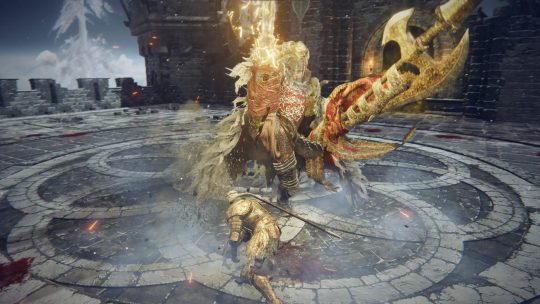
You can literally see him lift his leg up and use it as a weapon, but it's still on his leg! So basically you've failed to notice what was right in front of you, let alone finer details, yet you blame the devs and people that are able to see very readable motions 🙄🤦♂️ He is exactly what his lore says he is!
ALSO DON'T SCREECH IN ALL CAPS WHEN IT ISN'T FOR A PUNCHLINE AND THEN WONDER WHY PEOPLE COMPARE YOU WITH THIS PARTICULAR WOJACK FACE.
________
Yet AGAIN, bringing up bugs has no relevance to a talk about details, and that is what was being talked about. No one is saying From is perfect, but to dismiss any detail because "it might be just a mistake/reused asset" is stupid because when is the line drawn?
Generally, the one feeling attacked in this situation is you because you got so irritated that a super unpopular blog on a dead website said they didn't believe Fromsoft were lazy that you NEEDED to jump in while being fucking rude. Yes, you did a FINE job interjecting when someone DARED to not bash Fromsoft as strongly as you do, without even adding to the actual conversation. Like, this is what you did: latched on a small remark instead of talking about Ymir and Yuri. With such loud words about sLaViSh PrAiSe, consider arguing with big name Youtubers. Or don't. After all, with that Niall remark, you kind of...... shot yourself in the leg ( 🥁 )
Sometimes I wonder if the fingercreeper in Ymir's hands, Yuri (#2), is alive or dead. It has a very poor texture, completely different from the rest of the fingercreepers. Plus, he doesn't move at all. And lies in Ymir's hands like a dead spider - bringing all his limbs into one point (I'm not going to attach a picture to this...). So... I think it might be really dead?...
And I will NEVER believe in developers' laziness. They are very attentive to such things


#dash commentary#elden ring#🤦♂️#honestly that leg thing is all you need to know about the level of backup these people have#i hate all of this. thanks#honestly that wojack meme was deserved
100 notes
·
View notes
Text
some writing tips (pt. one)
warning: this is a long post bc brevity isn’t one of my strong suits. also another disclaimer: these are just things i have learned/have worked for me. feel free to ignore them if they don’t help you!
1. the crossroads of plot and character
there will often come times when writing where the plot must move in a direction that the characters don’t want to follow. this usually results in characters being forced to act in ways that are not congruous with who they are, making them feel wooden or inconsistent to the reader.
one thing that has really helped me is some advice i heard from the writer’s of breaking bad. they said that one thing that really helped them was to ask “where is character x’s head at?”, or basically “what is my character thinking/feeling at this point in the story?”. it is almost always superior to have character drive plot instead of the other way around, so this question can help solve the issue of plot not gelling with character. i like to ask myself this question and reorganize the plot around my answer, and i have found it very useful for combatting content-based writer’s block.
2. rethinking character flaws
i have only recently learned how to better write character flaws, and i have found that they are huge for making a character feel real. whenever i used to think about flaws, i thought of them as huge, character-warping traits that basically defined an individual (example: prince zuko), but i always struggled to write them myself. lately, i have come view them as subtle beliefs or tendencies my character has that frames the way they interact with the world and others, and that has been massively helpful for me.
as sleazy as it is, i’m going to use my own writing as an example because i don’t read books anymore lmfao. anyhow, in my fic, “just practice”, annabeth has a tendency to be self-absorbed, which manifests in her assuming everyone thinks the way she does. nothing impressive, really. we see a few examples of it in action sprinkled throughout the story, and at first, it seems harmless, but the more we see of it, the more we realize what a huge issue it is in the context of the narrative as a whole. we see that it cripples the way that she communicates with others, how it has led her to hurting people she cares about because she assumed things about them, etc.
the fic is written from her perspective, so when she interacts with people, we can see that she genuinely doesn’t mean any harm. she just has a certain way of thinking. but in reality, the way that her flaw impacts others in the story becomes a huge source of conflict. it requires people to call her out and make her reflect on things. this is something that i think a lot of people can relate to. pretty much everyone acts with good intentions, but in reality they could be causing a lot of harm to those around them without meaning to.
i have found that using subtle flaws like this can be really helpful in making a believable character. i would suggest looking at people in your own life and their flaws as material you can use. most of them aren’t prince zuko - they have much subtler flaws about them that still have a huge role in who they are. once you have a flaw in mind for a character, it should inform their psychological make up, in either a minor or major way. i like to make this influence as subtle as i possibly can because that is what i personally find to be most realistic (note: by influence, i mean the way that the flaw manifests itself).
these flaws can be used to completely drive the plot depending on your genre. romance, young adult, literary fiction, etc. are all great candidates. for example, “catcher in the rye” is literally a plotless story about a teenage boy navigating his flaws.
here is some additional advice: show examples of the character’s flaws in action, first without drawing much attention to them, but with each new instance, crank up the impact of the flaw. this results in a natural escalation that flows really well with character development.
3. choices and consequences
foreshadowing is one of the most important tools a writer has to creating a satisfying narrative. in contrast, poor foreshadowing can ruin a narrative. nearly everyone can attest to how a deus ex machina or “subversion” completely derailed an otherwise good story (looking at your Game of Thrones Season 8). at the same time, foreshadowing is really hard to do well because of how much foresight it requires. outliners have the luxury of accounting for this before they write, but as a discovery writer, foreshadowing can feel impossible during your first draft.
that being said, i have personally found a work-around as a discovery writer for this exact problem, and that answer is to have narrative consequences. pretty much every plot point in your story should have consequences for the rest of the narrative going forward. this makes it a lot more easy for a discovery writer to write a better first draft - you just have to think about what how current plot point impacts the story going forward.
example: character gets into a foolish fight and loses their sword-fighting arm. now for the rest of the narrative, they can no longer rely on their prowess as a swordsman.
the neat thing about consequences is that you don’t have to plan ahead of time, but they still function similarly to foreshadowing.
4. foreshadowing proper
okay, but what about actual foreshadowing, you might ask. i think this is really hard to give concrete advice for, but here are some things that have helped me. i tend to have a lose idea of really major plot points that need to happen in my stories (example: the kara conversation in chapter seven of just practice). then, i try and think about how i can lay a trail of bread crumbs for that plot point to happen and reverse engineer my way there (example: chapter six, kara is mentioned by annabeth’s friends as having done something unforgivable to percy).
more specifically, i like to use character flaws as set up for plot points (this ties into the idea of consequences above). example: annabeth is increasingly frustrated by percy’s hiding secrets from her, stoking her already inquisitive nature to a boiling point, leading her to confront kara when she gets the opportunity, even though she knows she shouldn’t.
i primarily write drama/romance, so using character flaws as foreshadowing is my favored way of foreshadowing. i don’t think it translates as well for a mystery or a fantasy, but in those cases, laying bread crumbs still helps. in the harry potter books, rowling was often fond of burying important clues in irrelevant information. example: in book two, there is a brief mention of tom riddle’s diary in ginny’s cauldron when lucius malfoy slips it there at diagon alley.
another thing she does is to include information against the backdrop of another, more urgent plot point. example: in book four, harry tries to steal from professor snape for a task in the triwizard tournament or something, and snape accuses him of stealing ingredients to make polyjuice potion but it was barty crouch jr. who needed it to disguise himself as professor moody. you don’t pay much attention at the time because the tournament is more pressing.
#this took for fucking ever#please reblog this im actually begging#if it does well i will do more#i have tried to include examples but i barely read so big oof#i barely remember harry potter so dont murder me for getting plot points wrong#i bolded the important take aways as well#feel free to ask me questions if something was unclear
60 notes
·
View notes
Text
Everything, or Nothing At All
Hello good, sweet, kind, wonderful friends who follow Flawed by Design.
Here is an epilogue which will not appear in the actual story, but which I*gleefully embraced and ran, ran so far away*toyed with the idea of at one point a few months ago.
If you’d prefer to wait for me to finish FbD prior to reading any spoilerish content, abort reading now.
John parked the warthog in the usual spot at the edge of the redwoods. He retrieved his pack, slung it over his shoulder, and hauled the camo tarp atop the vehicle so that it didn’t stand out like a sore thumb against the backdrop of the verdant mountainside. Then he turned and started into the forest. The trek generally took him two hours, and while the warthog could handle the terrain for part of the way, he preferred the solitude of travelling on foot.
Briar had also complained on the one occasion he had driven closer that the approach had been about as inconspicuous as he was - which was evidently not very, he’d been given to understand.
The hike gave him time to clear his head of the latest sim test results, the monotony of base life, and the lingering impotency of being involuntarily removed from active duty. He was still a highly functioning tactical asset, so while he understood the decision as it had been explained to him by Brass as a matter of PR, he didn’t like it. Linda didn’t either, but she never complained. Unsurprisingly, Fred and Kelly were transitioning from life in the field with the most ease. They were anticipating instructional appointments as an opportunity to guide and shape the next generation of Spartan-IVs.
Not him.
Pausing, John examined the trunk of one of the towering trees - more specifically the scarred markings some animal’s claws had torn into its bark. She’d informed him when he’d last left that there was a cougar lurking in the area. He continued on, the familiar weight of the M6H2 strapped to his thigh precluding any concerns about crossing paths with the predator. The territorial scorings didn’t appear recent, sap had already wept over the abrasions and hardened, but he still recentred his focus. Which wasn’t easily done as he tallied up just how long it’d been since he’d last left base.
An unfamiliar weight settled in his gut, but he knew it for what it was - guilt. Seven weeks was not inconsiderable. And while it hadn’t been his intention to avoid returning, neither had he sought rec time or leave in order to do so. Hadn’t even given it much thought between the day in, day out routine trials Blue team had been selected to participate in for the Gen3 MJOLNIR platform.
He now had to wonder if that had been subconsciously purposeful because of his conflicted feelings over the pregnancy. Briar had encouraged him to seek the input of Fred, Linda, and Kelly, and yet he’d not done that either. Not even when Fred had noted that he was behaving more introvertedly than was characteristic of him. The reason for that, at least, was logical. As Blue team’s leader, undermining the others’ confidence in him by requisitioning advice on a subject none of them were more likely to have experience with than he did was irrational. Fred and Kelly may be more sociable than he was, but he doubted they were concealing clandestine children out there in the systems somewhere. The thought nearly made him snort, in fact.
The elevation increase and time elapsed since he’d set out from the warthog suggested he was better than halfway there now.
Would she be displeased with him? He hadn’t gotten the sense his initial reaction had caused her to be so. If anything, she’d seemed as uncertain about the development as he’d been. She hadn’t questioned him when he’d prepared to head back to base earlier than planned. Just requested that he speak with his fellow Spartan-IIs.
The issue stemmed from the fact John had never factored children into his future. He’d factored another few decades of service in. But not much beyond that. And now, here he was; forced into semi-retirement for all intents and purposes, and staring fatherhood down the barrel. What that even involved, he couldn’t begin to fathom. His memories of his own childhood were so watered down and repressed that it took a Herculean effort just to recall that he’d possessed one at some distant point in the past. He would have a duty to protect the child, that much was obvious. And provide for it - though with the healthy settlement he’d been saddled with as compensation from the UNSC, there should prove no barrier to that.
What would life for a child born to two Spartans even look like? It had never been explicitly expressed, but there wasn’t a shadow of doubt in his mind they’d never been expected to produce offspring. And while the inquisition into Orion and the subsequent Spartan programs had clued up, and public perception had shifted dramatically in light of its innumerable findings, it still didn’t feel as though society was prepared for Spartans to fully re-integrate. At least, not IIs and IIIs. The IVs had been regular enlisted before being recruited into their program. They’d led normal lives. Had families. No so for his and Briar’s generation. Despite having been stationed there for six months now, Blue team still received a variety of conspicuous reactions from the base’s other personnel as they went about their assigned duties. He ignored them, but the relief of leaving it all behind when he drove past the last checkpoint and the wild landscape opened up before the warthog had been palpable.
The fact he looked forward to Briar’s company wasn’t the enigmatic response it had initially presented as to him any longer. With her, he was just John. And whatever that entailed, she took in stride. No expectations.
He smelled it before he saw it. The copper tang of blood hung heavy in the air as he approached the clearing the cottage occupied on the ridge. Through the foliage, tawny hide could be glimpsed. Brandishing his sidearm, he strained his honed senses for further signs of intrusion as he stalked in towards his quarry. Within twenty metres, John could detect the error in his assessment. The once-predator’s pelt hung from a make-shift frame of pliable branches, stretched out wide in a curious display of victory. So, she’d taken care of the cougar. Bypassing the trophy, he was returning the magnum to its holster when he noted the smear on the doorframe. Briar wasn’t as fastidiously tidy and organized as he was wont to be, but a bloody handprint seemed grisly even for her to disregard cleaning up.
John glanced back to the hide. The dark stain from blood which had pooled beneath it seemed to indicate it’d been hung there for some time. Hours, probably. His attention returned to the smeared handprint. Was it possibly not the result of the animal’s blood, but her own? Had she been injured?
“Briar?” he called not without apprehension as he pushed through the door and inside. Crimson droplets led directly across the rustic floorboards towards the lav. His heart rate kicked up a notch. She hadn’t responded. Dropping the pack with a thud, he stepped over the trail as he strode to the open doorway. No light spilled out, so he wasn’t surprised not to find her within, but the open med kit, mess of bandaging supplies, and blood ringing the sink did alarm him more than he cared to admit. She’d treated herself for whatever wound she’d received, he reasoned with himself. Everything was likely fine.
Noise outside pulled John away from the chaos which had been unleashed in the lav. He re-emerged from the cottage just as Briar was latching the door on the small tool shed he’d insisted they erect during his last visit, to remove the clutter of equipment from the limited space offered in the main living structure.
She looked about as bewildered by his presence as he felt about the scene he’d witnessed upon arrival, but as usual, recovered first. “Could have used your help earlier,” she commented while wiping her dirty hands on her already soiled pants. A combination of blood and grime interrupted their dark green camo patterning.
“With the cougar?” he surmised, having paused just outside the door.
“With burying it.”
That explained the mud, anyway. “Are you alright?” She appeared whole, but the med kit had been rummaged through for a purpose. Her black t-shirt revealed a few shallow lacerations on her arms, but none of them were bandaged.
Briar shrugged, or began to, though the motion was cut short by a grimace. “It got the jump on me, nothing serious.” She lingered by the shed, her gaze having shifted to the hide. “Should have driven it off a while ago.” It didn’t seem a conscious action, but one of her hands drifted briefly to her abdomen before falling back to her side.
It hit him with the sheer, unrestrained force of a NOVA. She’d been in danger - the child she carried, his child, had been in danger - and he hadn’t even known. No matter his uncertainty, the overwhelming and fierce instinct to protect that precious unborn life consumed him with an abruptness he’d never before experienced in his 48 years. He didn’t know what to expect from fatherhood, but the fear of having that opportunity snatched away by variables outside his control was perhaps the realest he’d ever known.
She was eying him pensively as he closed the distance between them. Dark strands of hair had escaped her braid and smudges on her cheek and temple implied she’d probably been pushing the loose locks out of her eyes. He reached up to do so for her now after she’d unsuccessfully attempted to blow them out of her line of sight.
“Are you going to tell me what you’re thinking, or should I stand here waiting like an idiot for you to say something for another ten minutes first?”
“I’m thinking that cougar chose its prey unwisely.”
She rolled her eyes, but they then shot down to where his hand had come to rest over her stomach before she could reply.
“And that I shouldn’t have waited so long to come back,” he supplied with regret. Not only did he now comprehend how cowardly it had been, even if it shamed him to ascribe such a trait to himself, it had nearly cost him more than he’d at first understood.
Briar was regarding him with an unreadable expression. She hadn’t stepped back, but neither did she seem particularly welcoming of his proximity. What must she have thought of him as the weeks had stretched on in his absence? “I knew you would,” she said after some time. “Eventually.” It didn’t sound as though that certainty had reassured her much, it was more of a statement of fact.
“I didn’t speak to the others about it.” She deserved to know he’d disregarded her request along with leaving her out here alone without explanation.
“John-”
“But I’m going to. When I go back.”
“It was just a suggestion-”
“What were the bandages for?” he cut her off, having already made up his mind on the matter. Blue team might not be able to offer parenting advice, but they would give him their honest assessment of the situation. And since the added responsibility could potentially affect his performance as team leader, they needed to be aware of that.
Sighing, she turned around and lifted her shirt to reveal the gauze padding haphazardly taped to her back. Blood had already seeped through several wads, suggesting the wounds they covered were deeper than those on her arms. “I’m going to clean up the shitstorm in there, I just wanted to deal with that asshole before dark,” she said while shooting the pelt a miffed glare and dropping her shirt again.
“So you decided to skin it.”
“Only after it tried to eat me.”
John took her by the arm to gently propel her inside. Fortunately, she didn’t resist. In the lav, he again turned her so that she faced the opposite direction and pulled the t-shirt up and over her head, prompting her to lift her arms in the process. Then he began the painstaking process of peeling the medical tape off, doing so slowly so as not to aggravate the injuries beneath.
All of this, Briar endured cooperatively in silence. Even when he applied the biogel, which he knew from plenty of personal experience, stung owing to its antiseptic component. Once he’d reapplied the bandaging in plush squares, he returned the supplies to the med kit and rinsed out the sink.
She was still standing in the same spot, shirt held in one hand as she faced the shower unit. Her posture didn’t point towards being receptive to physical contact, so he leaned against the doorframe to give her some space.
“Listen, I’ve been thinking… if this isn’t something you want to go through with, I understand.”
The sudden remark set him on edge almost as swiftly as the cougar pelt had. “Explain,” he prompted her when no further information was offered.
“Explain what - that neither one of us would have any clue how to raise a kid?” She was shaking her head and he knew without needing her to say more exactly where her doubts stemmed from. She’d confessed before to having no memory of her parents, and his own were vague impressions in the few flashbacks he’d experienced over the years.
“I want to try.”
When she turned around finally, she was frowning. “It’s not something you ‘try’, John. There are no trial runs. No sims. You can’t fuck it up, you don’t get to reset to alpha position.”
Jaw setting with determination, he pushed away from the doorway. “Then we don’t fail.” They’d been forged with a will to succeed at all costs as ingrained as the fundamental functions of breathing, eating, or sleeping.
“And we’re going to base it off of what? How Mendez treated us? The other drill instructors? AIs?” Briar moved to bypass him, but he prevented her by blocking her path. It wasn’t difficult in the confined space. “I won’t be responsible for screwing some kid up as badly as we were.”
“Some kid?” John repeated, chest tightening at the description of the child even now developing in her womb. He searched her features for some sign she held no attachment whatsoever to the new life they’d inadvertently created. All he saw was diffidence and frustration. This time when she tried to squeeze past, he caged her in against the cabinet the sink was built into, an arm to either side to keep her there. “I see you,” he told her, voice even despite his own inner turmoil. He couldn’t pressure her into a role she wasn’t prepared to undertake. Even if he’d come to the conclusion it was what he wanted. One of the few things he’d ever wanted - not because it was a duty he’d been trained and groomed to carry out, but because it was one he desired the privilege of fulfilling.
Dropping her gaze, she balled up the shirt. Her shoulders rose and fell with shallow breaths, another indication of her state of agitation.
It wasn’t something that came naturally to him, but he brought one hand up to cup her face nonetheless, offering her the comfort he perceived she required in that moment. He still recalled the light and foreign touch of her own fingers upon his cheek in ���Vadam’s keep. It’d been the first time anyone other than Fred, Kelly, Sam, or Linda had laid a hand on him for a purpose other than addressing an injury, delivering punishment, or examining his MJOLNIR since he’d been conscripted into the Spartan program. She’d advised him not to analyze it, but that’d proven impossible when, from that moment forth, a steadily growing part of him he hadn’t previously known existed had craved that contact. Expressing that hadn’t been something he’d been aware of how to do, or even whether he should do.
“What’s going on in there?” she asked quietly.
Chagrined to have lost focus, his brow furrowed. He ran his thumb over the dirt smudged across her cheekbone, but it didn’t remove the blemish. Neither did it diminish her appeal, however. “Thinking,” he answered. “About you.” About how much had changed for him in the time they’d known each other, none of it anything he could have ever predicted.
She was waiting for him to elaborate, he could tell.
“And about being something other than a Spartan.” Something more. Something he chose. “But only if it’s what you want.”
Her lips grazed his palm as she turned her head. She pressed a kiss there. “I want you.” Rising up onto the balls of her feet, she gripped his shoulders, the t-shirt slipping to the floor. “I want everything. With you. And it scares me, John.” And he could see it in her eyes. That terror. The fear of daring to want something.
Carefully drawing her in close with an arm around the small of her back, which hadn’t sustained any gouges, John held her gaze. “Someone told me being human can be like that.” He was expecting physical repercussions for the cheeky reminder, namely a punch, but gladly obliged when Briar instead tugged on his tags. Lowering his head, he released a pained grunt when her mouth only briefly met his before she captured his lower lip between her teeth.
“Smartass,” she scolded him with relish and then kissed him - properly this time.
15 notes
·
View notes
Text
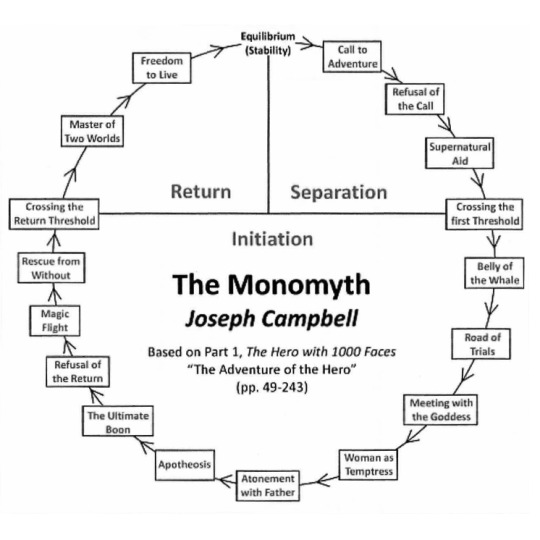
I think in my hurry to get through the one core rant without getting distracted, I didn't actually outline the Hero's Journey's whole proposed psych model in the first place. I don't want to get too into each of the 17 steps, but the idea of the process it reflects is this:
A boy on the cusp of adulthood must leave the comfort of parental protection/provision, whether he wants to or not. He must seek out the "magic" of an older mentor who has seen and mastered the unknown, and through that mentor they learn an entry level skill that will allow them to navigate the world of adults; but this is not "mastery" and it is not "understanding" it is only the bare bones functionality of mimicry. Understanding comes later. This happens, often, while still in the comfort of the "home" realm, where the dangers of the unknown aren't in play yet. Then they leave for real and confront the shock of an unfamiliar world, of autonomy, and responsibility; for the first time in their life, if something goes wrong, no one is there to help them.
Campbell himself posits this next step can go a few different ways. His standard format suggests the Belly of the Whale, the descent into the darkness of not knowing happens at the threshold itself, comes first. That upon confronting the unfamiliar new reality of adulthood the immediate reaction is to be overwhelmed, and only after addressing that immense pressure and aimlessness does the boy get to proceed out into the world at large with the understanding that out here, he can actually die.
But the alternative to this is that the boy goes from the crossing of the threshold directly into the Road of Trials, putting at his his magic aide's skills to use, and learning new ones, until that momentum of that growth and learning plateaus, and then THAT is the moment in which the hero is consumed unto the Belly of the Whale, not when he first confronts a reality that is beyond him, but when he first realizes that it's beyond him; when the arrogance and ignorance of youth gives way to humility. Here he has been facing danger and challenge but only now does he confront the inevitability of death; he cannot keep conquering the unknown forever.
I prefer the Belly-second format, because unlike the Belly-first form's processing of the idea that he can die, this is the fact that he will die; and then what legacy does he leave behind? And this directly motivates his shifting attention toward...
The Goddess Reconciliation is my problematic fav of this whole thing... Campbell and Jung believed deeply in this old fashioned notion of Anima and Animus, that there was some nearly mystical bioessentiallist quality of explicitly segregated Male and Female psyche, and a lot of that doesn't scan great these days. BUT! Of note is that their fixation on this duality came largely out of the idea that the two, being innately separate and at odds, needed to be balanced for a healthy mind to exist. In the psychospiritual spiritual approach to myth this means the Goddess is in fact a man's inner feminine aspect that need to be appeased and made peace with. And that's actually pretty cool, weird inner-cosmological premise to that aside.
But in regards to the myth as guidance, this is also the step in the journey that I just call Respect Women. Because that's what's being taught. This is the moment that the young boy/young man, until recently high on his own power and accomplishments, and his ongoing conquest of the unknown is confronted by a woman of great power. She resides in a realm above him, and for the first time in his quest he cannot conquer his way through this. He MUST speak with, negotiate, and empathize with this woman and her needs in order to win her favor and approval, and sometimes very literally hand in marriage.
This power she holds over him is often pretty literally the ability to have children, tying back into the newfound need to secure legacy that I mentioned in Belly of the Whale. But it can also be inheritance of fortune, positions of power and rulership, etc... in the realms of mythological and fairytale narratives. But it also reflects the internal idea of the joining of Anima and Animus, in that this marriage in one way or another, material or not, must bring him peace of mind.
Then there's the Woman as Temptress phase, which is woefully underused. Granted it can come across as a bit sexist and cliche in many narratives, and it's easy to see how that doesn't feel "essential" to most Hero Journeys, but I think this is incredibly important. Again, I prefer the Belly-second model in which the hero's conquests naturally lead to arrogance (he's on a winning streak, and he is still just a kid doing all this for the first time; he's never known defeat, so how does he even know when to slow his roll?) and this is a repeat of that; he's learned to please one woman, why not use his tried and true method of learning new skills and putting them to use to please more women? And so his loyalty to his Goddess must be tested in order to teach him moving forward.
This is the trope about Prince Charming being a playboy because his only trait is seducing women, not being good to them --see: Utena's Touga, or Into The Wood's Prince brothers. This is where a man learns not to be a fuckboi.
And then the confrontation with The Father. The legendary big Vader moment. But it's not always a violent confrontation, and it's not always innately negative; at times it can even be a somber affair. A boy must learn to stop idolizing his father, and make peace with the truth that his father is just a man, full of flaws like any other. And by reconciling his father as infallible patriarch and the hero's own process of growth, a boy must learn that to succeed in life he must be more than his father is/was. And this tends to become a violent or literal physical conflict when the father in question is both still alive, and the very literal authority that must be overcome in the name of progress. The patriarch has established a system of order that he sees as preserving the safety and security of the world of the known, and he will protect that system even as it begins to fall apart. And as a man, not longer a boy, but a peer to his father the hero has to show the father that he is no longer the unquestioned arbiter and effectively take his place.
In this the boy becomes man, hero attains some kind of enlightenment, sees some deep truth to the world and now knows with some clarity what is best for the world. An arrogant assertion to be sure, but internal to the journey at hand it makes enough sense... Because with this understanding the Hero also discovers or distills the mysteries of this wild realm of the unknown into The Ultimate Boon: a tool or a symbol of the skills learned, that can be replicated or utilized even without the hero's personal level of understanding. And this thing must be delivered back to the mundane so that the next generation of children can use it to expand their realm of the known further into what had before been unknown; each subsequent generation of hero expanding the collective knowledge and understanding of the community as a whole.
And Hero must also often learn selflessness. This kind of comes into play more often when there isn't the innate establishment of a desire to foster a legacy that will out last him. In this case the Hero needs to be talked into going home, because the alternative is that he continues to dwell in this state of perfection. But if he lives out his life like this, he will die as just a singular man rather than the Hero of a people. This in turn motivate the Rescue in which someone has to break into his little bubble of personal accomplishment to bring him back. Yet again his ego must be tested, and he must be humbled.
And then he goes back home, he's a Master of Two Worlds, the known and unknown alike, and he delivers The Boon to the common people so their lives can be made better by it. He earns the Freedom to Live and melds back into a mundane civilian life, as a productive member of his society, as a father, and eventually as a new hero's Magical Aide and old wizened mentor.
Shit.. I let this get away from me and shifted my whole rhetoric halfway in... >:/ My point wasn't to outline the mythic structure but the psychological one. So let me try to just summarize briefly now:
A boy needs to leave the comfort of home. He has to learn many new skills, starting with being taught by a teacher. He has to learn his limitations, finality and fatality. To secure a legacy he seeks a wife; to get a wife he must respect women; to keep a wife he must not be a fukboi. He must be a better father than his was. He must learn to want to give back to his community, and then return with knowledge and/or resources to better said community. He assumes a mundane life, he has kids who will grow up as he did; he'll be their father to overcome, and their mentor to learn from in time.
↑This is the Hero's Journey that Campbell became so fixated on, and that George Lucas maybe kind of oversold and muddled with film savvy, but that the original Star Wars still managed to embody and launch into the public consciousness. This is the Hero's Journey I wish more people would talk about and engage with, rather than the color-by-numbers nonsense that it's been reduced to.
6 notes
·
View notes
Note
I'm a bit ignorant in this whole field, but I was wondering about the boundaries of professionalism psychological counseling in FFS. Like if the time ever comes when Ef may no longer require therapy (if that even can happen? considering it also feels like his trauma will be a constant battle in his life and rightfully so), will Dr. Gary still be allowed to remain in his life as emotional support/maybe even friend? That honestly feels idealistic though tbh, so I wanted to get more insight.
Hi hi anon!
Ooo there’s two good things to talk about here. The first:
Like if the time ever comes when Ef may no longer require therapy (if that even can happen? considering it also feels like his trauma will be a constant battle in his life and rightfully so)
It’s actually a myth that people stop therapy once they’re mentally ‘healthy.’ People stop therapy once their goals are met. And usually those goals actually don’t include curing them of their disorders. Most people who exit therapy still have mental disorders, but they often exit when they have the tools to manage those disorders safely, and have achieved a level of function in human society (i.e. friends, possibly partners, hobbies, the ability to self-regulate or have mostly healthy coping mechanisms) that they’re happy with.
Shit fuck this got so long, sorry.
For example, I’m always going to have PTSD, major depressive disorder, and a couple of other things. But I’ve gone from needing therapy quite often, to only needing to go about once every 3-5 weeks, and as time goes by, eventually I’ll phase out to much less often, until finally I’ll probably only need to call when I have something unusual or an emergency.
So basically, Efnisien can have PTSD and Pure O forever, but he likely won’t need a therapist forever. Though he’ll need to see one longer than most people, because of the complexity of the mental injuries he’s endured.
will Dr. Gary still be allowed to remain in his life as emotional support/maybe even friend?
That might technically be possible, but not in the way you’re thinking, and for a few reasons:
1. If Efnisien exits therapy, but then needs it again, he can’t go back to having therapy with Dr Gary if he’s Dr Gary’s friend.
2. I’ll go into this in more detail below but... Dr Gary can’t stay as like, an emotional support if he’s not working in his role as therapist. Mostly because he’s a person, and he either gets paid for his job, or they renegotiate their connection.
3. Dual relationships are considered profoundly unethical and unprofessional in therapy. So this is like, when you’re friends with your therapist and also they’re your therapist. (A more extreme version is when you have a sexual relationship with your therapist and also they’re your therapist, but I’m not going to touch that one at all, lmao).
4. ‘Once a patient. Always a patient.’ This is partly because the therapy-client relationship is built on a fairly significant power differential, and that power differential is kind of impossible to unpack once you’ve kind of gone through it that way. (It’d be like trying to make your mother no longer a mother so you can ‘just’ be her friend, your brain still knows she’s your mother).
Like, you spill your secrets to someone who responds from professional distance. They want you to do well, but all they expect from you is payment. They’re not telling you anything that doesn’t help you the most as a patient in the moment (from their perspective), and you’re not finding out anything about them as a person. It’s wildly, inherently imbalanced in nature, and sets up flawed expectations (even the expectation that Efnisien could get emotional support in a friendship with Dr Gary is, itself, kind of a sign that it’s impossible to see him as a person and not a therapist, or not in a role where he centres Efnisien’s wellbeing possibly over his own).
5. Ending therapy, and the grief it brings, is actually a therapeutic technique that’s really relevant and important! It allows the client to grieve and cope on their own (something they’ll have to do in ‘normal’ life as well), and learn for themselves that they’re so much stronger than they used to be. It mimics other circumstances where they will lose things (or people) that really really mattered to them, but in a way that is guided and very safe, and can be done compassionately. It sets a client up to go ‘oh, I survived that, actually... I can do this.’ Ending therapy into ‘friendship’ kind of ruins that process.
The general adage is - it’s easier to find a good friend than it is to find a good therapist. So keep the two separated.
*
The *general* rule of thumb is that if a therapist and a client are going to be friends, it should happen around 2+ years after the therapeutic relationship has been exited, to make sure that the client is like, living an independent life and that friendship boundaries can be negotiated. This doesn’t make it ethical, by the way, or even a great idea, it just makes it slightly less unethical (there are exceptions to the rule, but Efnisien and Dr Gary don’t meet any of those exceptions). Personally I’m still not a fan of it, and I don’t think it should happen in Efnisien’s and Dr Gary’s situation anyway. (I have no problems with people imagining it happening! And maybe there are AUs where Gary isn’t a therapist, but ends up become Efnisien’s friend, etc.! But I can’t imagine it for myself).
No WAY should Dr Gary be Efnisien’s emotional support and a friend. He’s either a friend, or he’s a professional, not both. There’s never a future (except in fantasy land) where Efnisien should be allowed to see Dr Gary after therapy as a friend to talk about how hard his life is and get therapeutic advice. That’s just ‘free therapy’ which is bad for both of them.
(Also, we don’t know what Dr Gary is like as a friend. It’s a fact of life that quite a few therapists are well, not that empathetic as friends, because they’re so tired from supporting their clients all day they don’t have much energy left to support their friends, lol. I say this as a person who has a lot of friends who work as therapists and psychologists (which is how I know it’s not always true, but it’s sometimes true!))
Something Efnisien could ethically do after seeing Dr Gary (also, Efnisien will still be seeing Dr Gary once this story finishes, lol, getting *some* support in his life doesn’t clear him to exit therapy at all) is send Dr Gary updates or emails about his life sometimes. Or have like a once a year session to just catch up, that’s a lot more relaxed and just going over how things have been. Like just because they terminate therapy, doesn’t mean Efnisien can’t update to say like ‘things are going well, thanks for everything’ and Dr Gary can’t reply with ‘I’m so glad to hear that’ etc.
But overall, the exiting process re: therapy is actually a really important part of therapy! It’s actually even more important if both parties have experienced positive transference (i.e. really liking each other / wanting to stay friends).
I’ve had to wrestle with this a bit myself. Like, in real life. Sometimes it’s really tempting to stay friends with your therapist. But yeah, outside of just daydreaming about it, or imagining it, it’s not something I see happening for Efnisien even though I really love Dr Gary, and I really love the way Dr Gary and Efnisien act together. It’s not something to worry about in the story anyway, we won’t be seeing Efnisien exiting therapy even if he’s really worried about Dr Gary getting rid of him, lol.
#asks and answers#falling falling stars#fae tales#fae tales AU#efnisien ap wledig#dr gary konowalous#i'm not a therapist#or anything#i've done a lot of research#and i have a lot of books#and i've been through a lot of therapy#but like#it's always good to err towards caution anyway#there are medical professionals in my life who've treated me who i've adored#yeah i'm not friends with 'em#especially not the therapists#it's hard to explain#but one day it's just like 'oh no no no that...will be bad'#trust me the therapists most likely to abuse you#are the ones most likely to start treating you like a friend#even during therapy#and *that* i know from experience#sadly#Anonymous
47 notes
·
View notes
Text
A Comparison Of Contemporary Landscape Photography With Traditional 19th Century Landscape Painting
The aesthetics of both contemporary landscape photography and traditional 19th century landscape painting hold much the same purpose, the objectification of nature as a servant to human kind. Both practices give misguided representations that nature is something which is ours to have. This way of seeing is an anthropocentric hangover that has no place in contemporary aesthetics because the belief that nature is ours to have because it belongs to humans is outdated and no longer practical or realistic in today’s world.
19th century landscape painting is from a time when all people believed all of everything on Earth was here exclusively for humans to exploit, consume and dominate as they please. There were scientists and thinkers during this century who began to consider that perhaps nature was not here for us. Alfred Russell Wallace wrote in his book, The Malay Archipelago, that he noticed that very large fruits grow on very tall trees throughout the region. He suspected if one of these large fruits should fall on a human from such a height, it would likely kill them. He questioned why and if these plants were truly put there by god with exclusive reference to human kind. I am guessing that at the time, not many Europeans had seen large fruits growing on incredibly lofty trees.
Another figure, who had thoughts like this in the same era, was Henry David Thoreau. His book Walden explores what it is to live off the land without exploiting the land or the creatures on it. He did not hunt or keep animals and he grew a permaculture-esque farm/garden. He did this as capitalism was still growing into the dominant way of living in the western world. It is incredibly compelling to read the experiences of someone rejecting the latest fashion trends, a glamorous life based around financial assets and the need to eat meat on a daily basis in the context of that particular moment on the timeline of human history. The themes central to this book examine the state of the world and the ways in which people live on it and engage with it, the observations Thoreau makes are pertinent to scrutinising how we exist today.
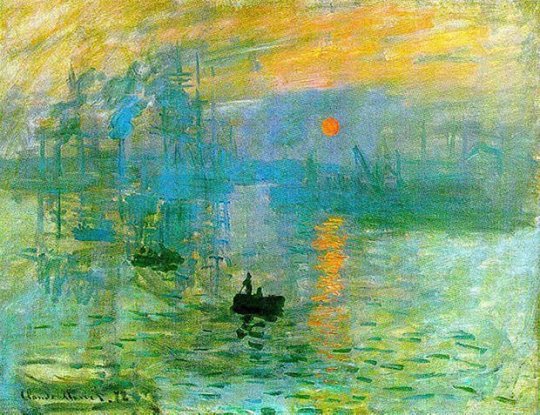
Sunrise - Claude Monet
Landscape painting from this time does not share the same progressive thinking. At least, if it did at all, that is not why the paintings are cherished today. The 3 examples I have chosen, each show a romanticised view of a landscape that has been largely altered by the domineering presence of humans. The views also show people working or give the idea of work. Work is an unnatural process exclusive to humanity, it is the method and process of human domination of nature. In his book, Future Primitive Revisited, John Zerzan refers to this as the division of labour. Zerzan explains that there is a symbiotic relationship between the division of labour and domestication of humanity and nature that perpetuates negative cycles in human social structures.
Monet’s Sunrise shows what is still celebrated today as a beautiful sunrise scene. In reality it is a factory. Based on the era in which it was painted, it is presumably full of workers in poor working conditions. The factory is causing a great smog which is completely altering how the view of the river before it appears. The painting beautifies the cancerous smog as scenic and romanticises the factory as if it is something other than an eyesore, filled with miserable people. By extension, it celebrates the idea that humans and nature are here purely to serve capitalism by being functional workers. Humanity, in this painting, is not shown as a part of nature but as a tool for its subjugation.
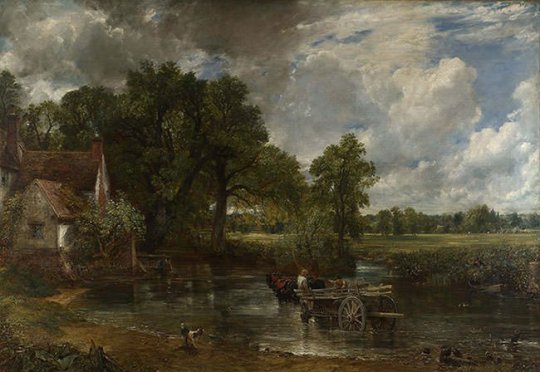
The Hay Wain - John Constable
The Hay Wain by John Constable gives us a peaceful view of a man working the landscape of his farm with his horse and his dog. This painting is renowned for its beauty. Constable’s paintings have been so celebrated, that the entire area where they were mostly created is still preserved to this day as the Dedham Area Of Outstanding Natural Beauty (ANOB). This so-called beauty is the farmed landscape of south-east England. This area was once, in its entirety; ancient, deciduous woodland but is no longer so due to the consequences of work and human activity.
This molestation of an entire habitat is something the British government seeks to preserve for tourism and capital gain. This is done under the guise of maintaining the lie that the quiet countryside of little England is; A: a reality available for all to attain B: a beautiful thing because it is still in it’s natural state. Again, within a painting celebrated for its beauty in depicting nature, we have ugliness and artificiality. A destroyed habitat, forced animal labour of the horse, a dog breed (Border Collie) selectively bred to exploit obsessive behavioural tendencies and forced to work. Here again, humans, animals and the land represent the means of the domestication of nature in order to create an artificial, human-dominated landscape. This painting tells us that nature only has merit if it has a purpose in serving the functionality of the human world. Nothing about it is natural, or beautiful.
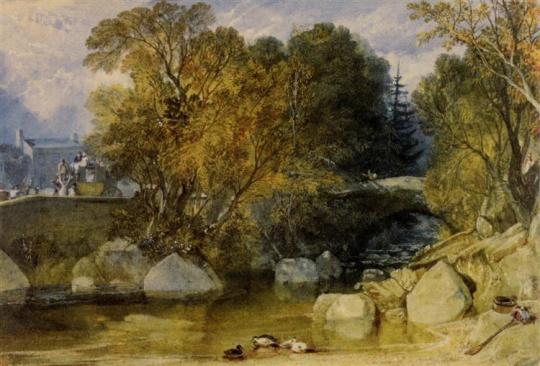
Ivy Bridge, Devonshire - JMW Turner
Ivy Bridge, Devonshire by JMW Turner is similar to the previously mentioned landscape paintings. The natural landscape is sliced by a bridge being crossed by a horse-drawn cart in an area of England densely littered with ANOBs. I am not certain if each of the artists’ intentions were necessarily to celebrate these altered and artificial landscapes as natural beauty in their works. It is said that Turner wrote a poem of his experiences working on the Devonshire commissions revealing that the landscape raised questions about morality for him. It could be that Turner and the landscape painters of the 19th century were attempting to expose the fakeness of the setup. Nonetheless, the paintings are today incorrectly treasured as depicting the beauty of the world in it’s natural state.
The foundation of the idea that these paintings display to us natural beauty come from the views of people who lived in an era when it was conventional to believe that the Earth and nature were there for humans to sculpt in whatever way they liked. This essentially means that to celebrate these paintings today as natural and beautiful is to celebrate human domination of Earth and the domestication of its people and creatures. This celebration preserves two great lies. The first lie is that the Earth, as manipulated by humans, is in it’s natural state. The second lie; This manipulation, caused by human domination, is beautiful.

Thomas Heaton
All of the contemporary-traditional landscape photographers I have looked at are well known on instagram and each of their posts boast thousands of likes, often in the name of conservation. When I look at their photographs, I feel uninspired. How could this be so? Nature is inspiring. They are technically spectacular photographs of incredible scenery but post-production techniques such as the over-saturation of the colours create an unrealness. This is uncomfortable because it presents nature as having to be more than what it actually is to be considered a sight worthy of seeing. While thousands of people do engage with these photographs online, what does it do now for changing how we intereact with nature? How does it change the fundamental way we see the world and does it seek to change the anthropocentric viewpoint that the world is here for us?

Daniel Kordan
This style of photography has not progressed much since Ansel Adams pioneered it last century. Someone told me that this kind of photography is important because it shows people what we stand to lose if humans continue on this path of domination and extraction of nature. I ask the question then, is this tactic flawed? This method of revealing the beauty of nature in photography is not new. It has been a somewhat ubiquitos model for conservation and widespread awareness of nature in photography since Ansel Adams began his career in the 1920s. While this has achieved some huge successes in protecting wild landscapes, these very landscapes are still under threat.
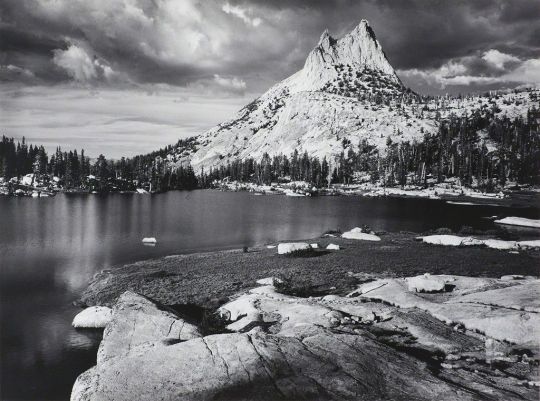
Ansel Adams, Cathedral Peak and Lake, Yosemite National Park, 1938
Climate change, habitat & biodiversity loss are not known as entities who recognise borders and boundaries. Our activies outside proctected areas affect what is within them. I view this kind of photography as a green-washing activity. Consciously our not, these photographers play into the narrative that the landscape is something to be conquered. This is reflected in the corporate funding these photographers receive to travel the world and take these spectacular shots and then share them online with generic captions such as “Get out there and live it.”
The consequnece of this tactic inspires swarms of amateur photographers into contributing to destructive tourism practices, not to mention the volume of iphones and camera gear purchased. These tourists flood the landscape and attempt to recreate, often successfully, the style of their favourite landscape photographers’ work. They too can share the images on social media and receive kudos for how in touch with nature they are, compliments are given to their highly technical photography.
This style of photography ignores at large the impacts of current ways in which the human world engages with nature. These photographers leave the inevitable cigarette-butts, food packaging and other litter spread throughout almost any natural landscape out of frame. They might not even see the trash, it is hard to see human waste in a landscape when you do not want to see it. If photographs dealing with conservation of nature showed us the real way in which we interact with nature, would humans therefore be able to finally see nature?
This raises the question of what makes the professional a more worthy artist than the amateur recreationists? The method is also boring, old fashioned and it does not work. Why is climate change etc. getting worse if the tactic of showing people what we might lose is successful? This is because it is not, truly successful. It creates a narrative that the world is our pretty little thing to look at and this objectifies it. Photographers are asking people to look, but not see. In essence, professional landscape photographers whore out to us 5-second-views of a world that really requires vast amounts of time invested in multi-sensory observation to actually see. This tactic does nothing to push for a fundamental shift in how all humans interact with the more-than-human natural world because it does nothing to ensure that nature is seen. If nature is not even seen, how can we challenge the ways which humans see it and engage with it? The practice of how nature is represented in art must change in order to facilitate a change in the ideological practice of seeing nature.

Psychescape - Terri Loewenthal
Photographers like Terri Loewenthal speculate that perhaps the views of nature offered from art is a gendered issue and that we are too used to male-dominated views of the world. She seeks to reject technically-accurate recreations of landscape through photography by choosing to explore imperfection with her photographic practice. She does this in her Psychescape series of works by using a hand-built optic that manipulates the colours and shapes in a photograph at the moment of shooting. She is changing how her camera sees the world, in order to ask us to change how we see the world. Loewenthal intends to achieve this, unlike Ansel Adams and so many after him, by not keeping the human world out of shot. To show views of nature that include humanity which are beautiful in their coexistence.
Contemporary landscape photography and traditional 19th century landscape painting share a similar view of the world in both aesthetics and ideology. They continue to feed a narrative that the human-world is outside of the natural world, that the two are separate. The practice of doing so has led to a great un-seeing of nature from humans in art and lived experience. We know that we need to change the ways in which humans live and interact with the world in order to ensure that humans can continue to exist in the world. We know that it is necessary for humans to coexist with nature in order to take steps in dealing with climate change and other such natural world catastrophes of the contemporary era. For a long time, landscape painting and landscape photography has refused to play a role in changing how we see nature by showing human dominated views and misleading interpretations of the way that nature is before us. Artists are now seeking to show that humans and nature are part of the same whole. Rejecting views which celebrate the human domination and domestication of nature by bringing the interconnectedness of humans and nature into aesthetics is key to fundamentally shifting the role of art in shaping how humans see nature.
#landscape painting#landscape photography#traditional#nature#climate change#art#art writing#claude monet#john constable#jmw turner#ansel adams#national park#yosemte national park#dedham area of outstanding natural beauty#aestheitcs
4 notes
·
View notes
Text
Dazai and Chuuya: Ningen Shikkaku
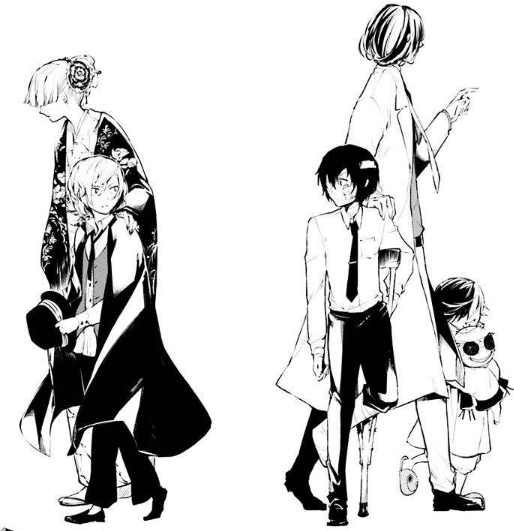
Chuuya and Dazai are one of the most heavily discussed partnerships in the manga. The two of them are clearly set up as foils the same way Atsushi and Akutagawa the main character and the main rival are. However, while Atsushi and Akutagawa are “different, but the same” in a way that makes them come into conflict the partnership between Chuuya and Dazai reads differently to me. Rather than “different, but the same” its “Different, but desires the same” as both Chuuya and Dazai desire to live as human beings but go about achieving that in completely different ways.
For more analysis on “Double Black” or “Soukoku” and their connection to “Ningen Shikkaku” or “No Longer Human” the author Osamu Dazai’s most famous work, read under the cut.
Double Black is a partnership that functions despite the two characters seeming hatred of one another. It’s a rivalry and a friendship in one, because while both of them are constantly competing and put off by one another.
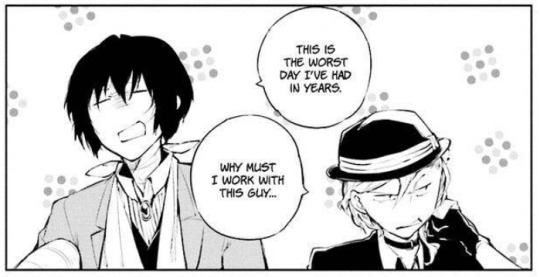
Both Chuuya and Dazai also know each other well. They are so familiar with the other so much so that the other functions as an extension of their own self. Therefore their hatred of each other comes not from being unable to comprehend the other but rather familiarity. They hate each other because they know each other. They also, get the other.
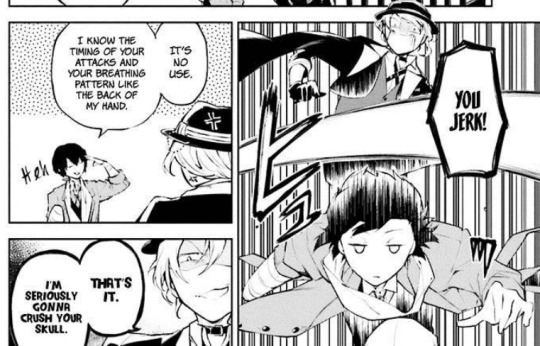
I would go one step further to say both of them see each other as a person, in the others eyes, which is also something that frustrates them. When Chuuya is introduced to Dazai in Fifteen it’s all too easy to see him as a suicidal maniac or a cold blooded mafioso. However, against CHuuya’s own wishes he comes to understand Dazai by the end of the story as someone who wants to live.
1. On Dazai and Human Beings
Dazai as well has a tendency to not see the people around them as people. While not extreme as Dostoevsky is, Dazai is manipulative, and explicitly has been referenced several times to move people around like chess pieces on a board.
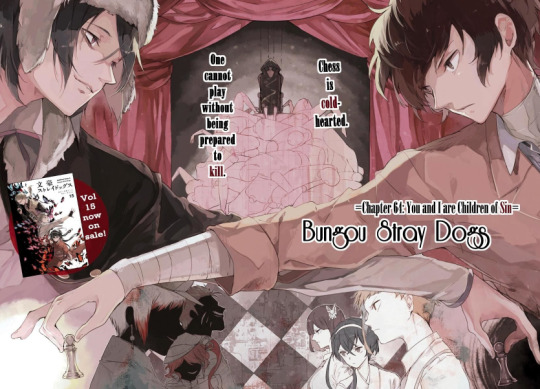
It’s important to notice that Dazai’s behavior is not just the result of him being a brilliant mastermind. Though, it is a symptom of him being so smart it is practically a flaw in his character. If you read Dostoevsky as a foil to inform us on Dazai’s mindset (as Dazai tends to be cagey about where his own thoughts and beliefs lie especially to the audience) then, Dazai’s thinking is similiar to Fyodor he can read the thoughts of others so well that it’s hard for him to consider them an equal unless they have the same level of intellect as him.
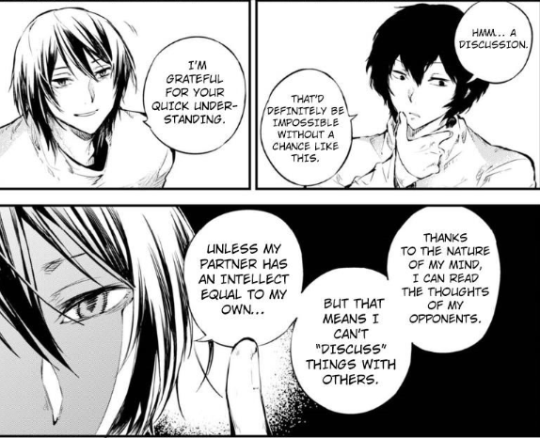
In other words Dazai is so used to being the smartest person in the room, that it’s done the exact opposite for his development. Oda in general has always had the best read on Dazai.
‘‘That guy is just a child who’s too smart. Just a crying child who’s been left alone in the darkness, a world of nothingness far emptier than the world we can see.’’
Dazai is so smart he can read the situation while literally in jail with little to no contact with the outside world, just because he’s predicted the actions of everybody involved probably weeks in advance, then relay those orders to Ango. His method of planning is always to make plans on his own that predict the actions of others, and then trusting that they will follow through on his predictions of them without even telling them what he expects. Dazai is able to anticipate their actions in certain situations so well, it begins to seem as if they are not complex organisms independent from him with their own thoughts and feelings, but instead pre-programmed npcs on the rails serving their role in his game.
This predictive ability is something that has utterly stunted him as a person. We know nothing about Dazai as a child beyond his relationship with Mori, and the fact that he was already suicidal at fifteen years old but imagine what it must be like growing up when you are already smarter than most adults you meet. Children need adults to guide them in their formative years. However, Dazai who even as a child is already smart enough to see the hypocrisies present in the adults trying to guide him (Mori again, who was probably the worst person to raise someone like Dazai, but more on that later) Dazai is someone who has absolutely no incentive to grow up. Therefore he stays a child in the darkness, therefore he stays lost.
It’s Dazai’s natural tendency to not see people around him as human beings capable of making their own decisions, and with a rich internal world that is separate from their own. It’s also a flaw he has to fight against. This is why we see him despite Akutagawa’s desperation for a connection with him, separating himself from Akutagawa unless he needs something from him. This is why even though he does genuinely trust and value the Detective Agency, why Dazai has a habit of going off on his own, never informing the others of his actions and his intentions until it comes time to make a decision. While Dazai is better than Fyodor, this is still manipulative behavior. Here’s the thing the less information you let another person have the less control they have over the situation. Especially if when it comes time to make the decision you frontload them with all of the information that you were holding back all along with the intention of pointing them to the decision you want them to make. Dazai does this all with good intentions, but he still relies on his tricks from his mafia days to achieve them. Dazai doesn’t trust other people with all the information, up front, and trust them with transparency of his intentions.
In that way he doesn’t give them full free independence to move. Dazai is so good at reading people on the surface, and the way they act externally, that he basically has no interest in their internal worlds at all.
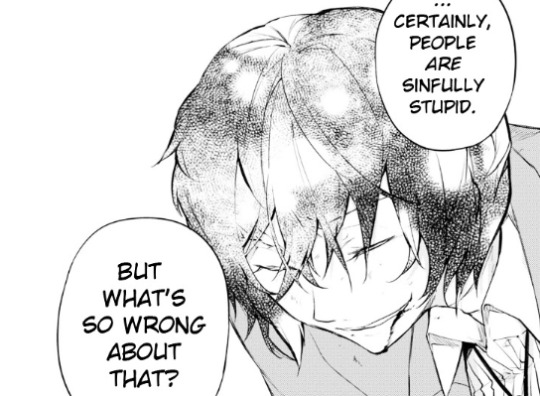
Dazai enjoys humans as a whole, he wants to help them rather than Fyodor who wants to kill them to save them from their own sinfulness. However, it’s important to recognize he still talks about humans as a whole like an outsider of the group. As if he’s an observer looking at the herd of humanity, and something else rather than a human being himself.
Which finally ties to the literary influence in Dazai’s character. A lot of this comes from Ōba Yōzō, the protagonist of no longer human, a troubled man incapable of revealing his true self to others, and who is instead forced to uphold a facade of hollow jocularity.
Yozo speaks over and over again about human beings as a whole as if they were some kind of aliens he was never meant to understand.
In other words, you might say that I have no understanding of what makes human beings tick.
[...]
I might have already been disqualified as living among human beings.
[...]
I find it difficult to understand the kind of human being who lives, or who is sure he can live, purely, happily, serenely while engaged in deceit. Human beings never did teach me that abstruse secret. If I had only known that one thing I should never had to dread human beings so, nor should I have opposed myself to human life, nor tasted such torments of hell every night.
[...]
I have tried insofar as possible to avoid getting involved in the sordid complication of human beings.
[...]
I know that I am liked by other people, but I seem to be deficient in the faculty to love others, (I should add that I have very strong doubts as to whether human beings possess this faculty.)
Especially with the last quote it becomes apparent what Yozo’s real issue is. He is unable to see himself as a human being, and therefore he projects his dehumanization and sense of alienation onto all others. It’s not Human Beings as the problem, but rather Yozo’s complete inability to see, or treat other people as people that leads to his further isolation from them.
Which connects to Dazai’s character really well. He sees himself as some kind of nonliving thing, a corpse that keeps walking around delaying his eventual suicide, and therefore he does not see other people around him as people too. He projects that they are the ones who are far too difficult to understand, who are far to seethrough and transparent that he sees all of their hypocrisies and is afraid of them. Yet, Dazai never confronts his own hypocrisies either even though he is rife with them. He projects outward his fears about himself onto other people, but it’s Dazai who understands himself the least, and it’s Dazai who sees himself as the least human.
Notice that Dazai’s sense of alienation may come from his intelligence, but at the same time his one and only friend and the most important person in his life was not a super genius. Mori is the person who in the Port Mafia who has the most in common with Dazai seeing people as mere tools to move according to his wants, and even attempting to mentor Dazai to do the same. It’s Oda, who is not a genius. Rather, Dazai sees Oda as a good person, something he can never see himself as being.
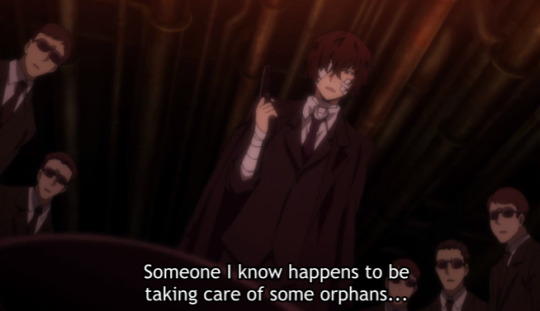
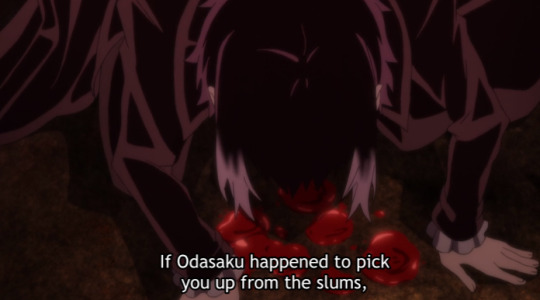
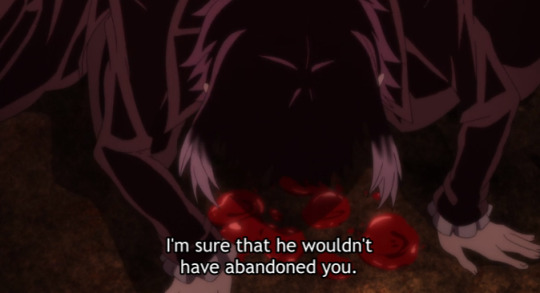
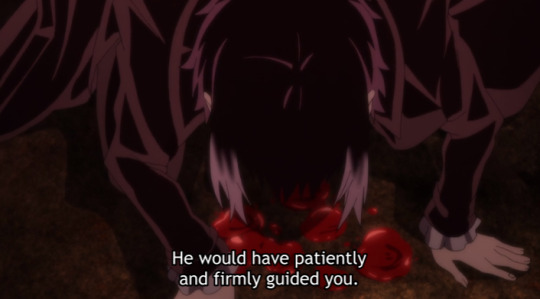
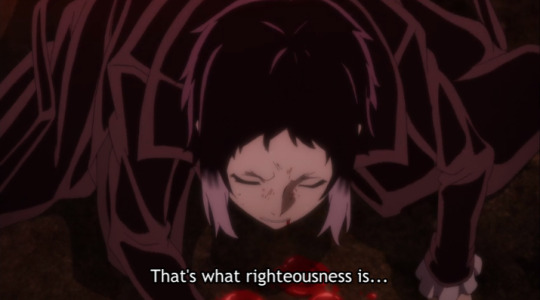
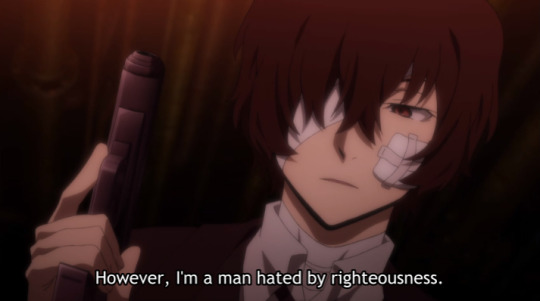
That’s what Dazai’s lesson in “Dark Era” is. There is no magical components inside of you that makes you a good person. From the way Dazai talks he’s already aware at least what the right thing to do, he just doesn’t do it at the time. The thing is Oda wasn’t born a good person. He just decided to become one in his own way one day. He had the freedom to choose that and define himself. Dazai is so scared of what a bad person he is, he lacks the self reflection to try to define himself and keeps his internal workings a mystery probably even to himself.
Oda was Dazai’s friend and equal, even though he was not a super genius like Fyodor or a cunning manipulator like Mori, because he saw and treated Dazai consistently like a human being. That was the only great secret to the mystery that is Osamu Dazai. The mystery is that there’s not much of a mystery at all, Dazai just fools you into believing that he’s an unreadable ghost because he does not want other people, or more likely himself to understand his own actions. He is a paradox, smarter than everyone around him, and yet deeply insecure and finding himself inferior to all other human beings and their values of righteousness. This is why Dazai’s other biggest foil besides Chuuya is Kunikida, someone who strives for the ideal while Dazai is someone who falls far below the ideal. But those ideals in the first place, are just human concepts that were thought up by human beings, not natural things they were born with.
As smart as he is, Dazai doesn’t get that. He doesn’t understand that the things that sabotage him from righteousness are not supposed inhuman flaws and qualities that he has. Rather, because of his painfully human flaws, his insecurities towards others, his inability to connect, him being trapped inside of his own head, and only perceiving things from his own point of view. Dazai is clearly not intended to be a psychopath, he has emotions as he was clearly distraught by Oda’s death, he clearly has the ability to make connections to other people and values those connections to the point where he’s clearly trying to improve how he treats Atsushi vs how he treated Akutagawa. “I’m hated by righteousness”, and “I’m a bad person” him being an inhuman, unfeeling demon is just Dazai’s own personal narrative to stop him from confronting the weakness of his own character.
The joke of No Longer Human is that Yozo while not seeing himself as a human being, is tripped up by what are very obviously human qualities, his anxiety towards other people, his need to be loved, his fear or rejection causing him to hide his true self. Dazai Osamu is as human as everybody else, but he denies his own humanity, thus he is the human failure, thus he is disqualified from being a human being, thus he is no longer human.
2. On Chuuya and Human Beings
Unlike Dazai, Chuuya has far more of a claim to not being a human being. After all, he literally sees himself as an empty body possessed by Arahabaki who is a weird extra dimensional being.
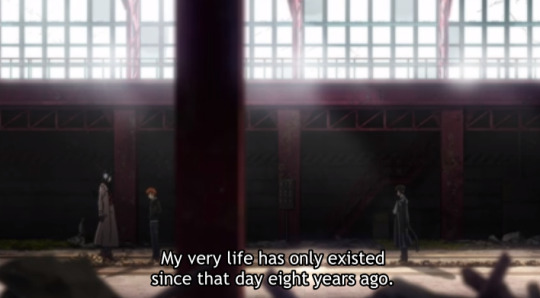
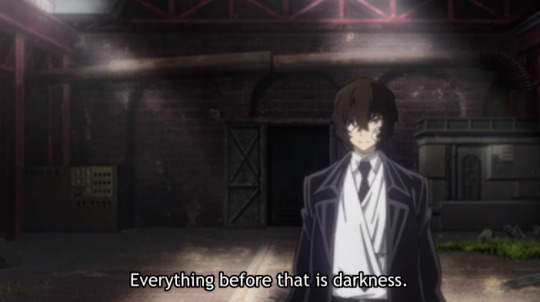
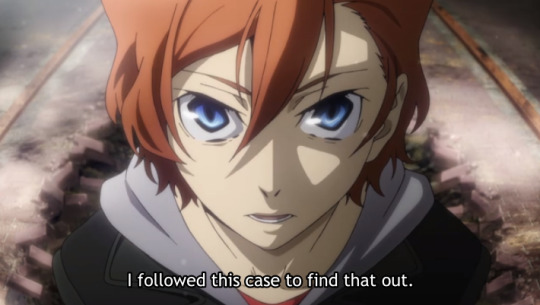
Chuuya is Dazai’s inverse, rather than someone who actively and habitually avoids his own humanity, Chuuya is desperate to learn about his origins. He wants to fill in the darkness and the gaps in himself, whereas Dazai would rather leave things in the dark.
The irony of course being that Chuuya, even though he has some kind of unknowable void inside of him and his origins are completely a mystery even to him, to the point where he does not know if he was a corpse that was resurrected, a child that was possessed after being used by experiments, and if his current identity is his own, if there are vestiges of his old identity, if he’s entirely arahabaki, or a fusion of the two. Chuuya’s origin is confusing even to him, and this is entirely on purpose. Unlike Dazai who avoids confronting his true nature nature, Chuuya’s true nature is unknowable even when he searches for it. The irony being, that even though one could make the argument that Chuuya is genuinely an inhuman entity, that Chuuya is much more human on the surface than Dazai and gets along with other human beings better than Dazai ever could.
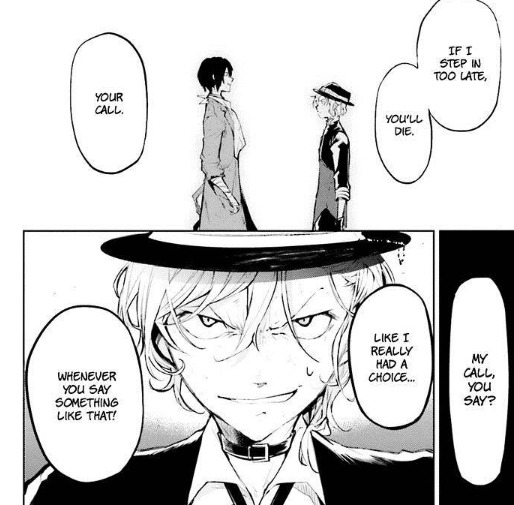
Unlike Dazai who can predict people so far in advance that he does not ned to trust others, and therefore often makes decisions for them, or withholds information until the last moment and infleunces them into making the choice he wants to make, Chuuya is someone who fundamentally trusts others. Even down to his ability “Tainted” using it requires him to trust the fact that Dazai who he supposedly hates and who hates him in return will be there to stop it.
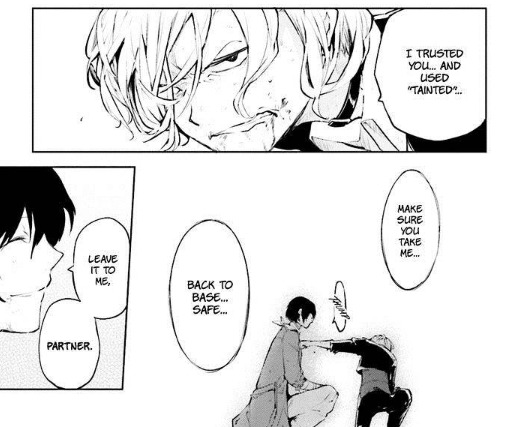
If “isolation” is a central theme to Dazai’s character, then “Trust” and “Loyalty” are what is most important to Chuuya. His entire identity revolves around them. This is also specifically from his origins, Chuuya had nothing, no place of belonging, no memories of the past, just an unfathomable black void in his mind when he was found. That is why he relies on the others around him entirely to give him any sense of identity.
If Dazai’s inability to trust is a flaw. If he cannot see righteousness, trust, or loyalty, because he sees through people too well to believe in those ideals and only sees them as hypocrisy. Then, Chuuya’s flaw is that he trusts too much. That he believes in trust and loyalty to the people around him to the point that he lets them use him. Dazai was only able to find his identity after leaving the mafia, but Chuuya’s identity is so tied up in the mafia, that he could never leave, or never doubt someone like Mori the way Dazai does.
It’s apparent in his relationship with the Sheep in “Fifteen.”
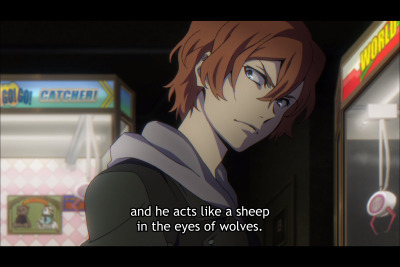
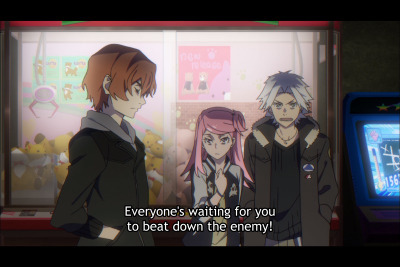
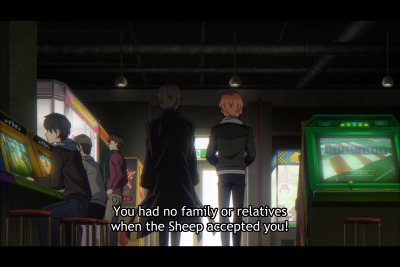
The Sheep insist that Chuuya is obligated to fight for them because he has a strong ability, despite the fact that he’s the leader they almost never listen to him even when he only has their best interest in mind.
Dazai tells him he “acts like a sheep in the eyes of wolfs.” If Dazai is someone who considers himself an outside, like a shepard who can never truly belong in the herd but can guide them in their best interest. Then Chuuya sees himself as a wolf pretending to be a sheep. Not with the intent of eating them, but because he desperately wants to be recognized as a part of the herd. Unlike Dazai Chuuya is much more open about his want to have a sense of belonging with other people. However, instead of being accepted he had the opposite result. Chuuya was a sheep all along, and the others were like wolves deceiving him only to prey on him and take advantage of him. Chuuya had no family or relatives, and he still sees the sheep as better than him for accepting him despite him knowing nothing about himself. He sees himself as someone lower than them because of that inhuman part of his character and the things he does not know about himself. The truth is though, that Chuuya is just another sheep and Dazai can see it as plain as day.
His want to be accepted, his want to have a place of belongings, his want to have a personality, mind, values, the way he takes his identity from others around him, those are all human traits. Dazai sees this, especially since these are desires that Dazai deliberately avoids and denies himself.
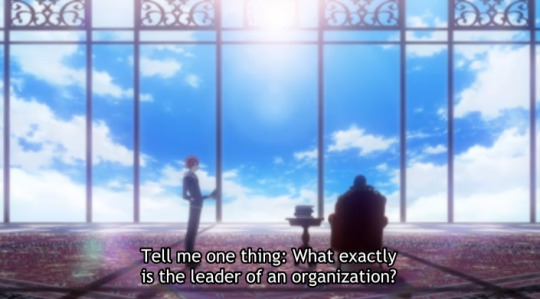
Chuuya as a peson is someone who is desperately seeking answers for himself. However, he does not believe he has those answers inside of himself. He sees himself as someone who is unnatural, and therefore far inferior to the other human beings around him. Therefore he relies on the guidance of “human beings”. Which is his exact flaw that always results in him being loyal to the wrong people.
Mori is a bad person, but he also gave Chuuya the answers that Chuuya needed the most, when he needed them the most.
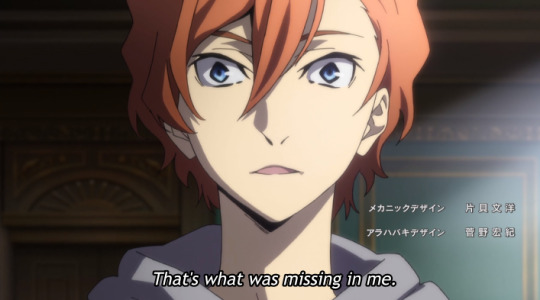
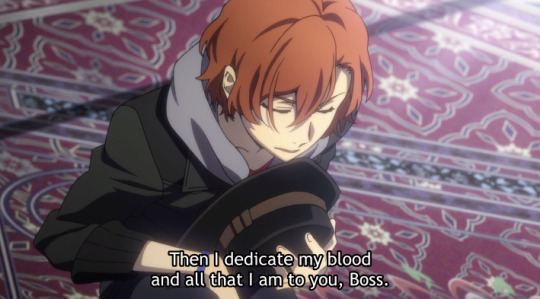
Chuuya believes there is something missing inside of himself, and his loyalty to the port mafia, and the others is something that can fulfill that missing thing, but he’s wrong and such blind loyalty only results in him getting used repeatedly. As he sees himself as an inhuman tool in the first place, he thinks he can be fulfilled by finding someone to use him the right way.
3. Dazai and Chuuya’s Relationship
So, Dazai and Chuuya deep inside of themselves both want the same thing. They both want to find their place among human beings. They go about it in opposite ways. Dazai ran away from the mafia and chose the path of saving people. Chuuya stayed with the mafia and chose the path of loyalty to find a place of belonging.
I don’t write meta to declare characters good or bad people, but Dazai is kind of a jerk. He’s manipulative and does not see other people as individuals but rather pieces he can move around to get what he wants, and yet he is on the side of saving people. Chuuya sees other human beings as individuals and he sees himself as the tool. He is generally much more concerned about the welfare of individual people. He is capable of trusting others. He is concerned for Akutagawa’s well being and treats him much better than Dazai ever did. He fights to protect his friends, and values life a whole lot more. Yet, at the same time he’s on the side of the Port Mafia, he’s on the side of killing people for the mafia.
One of Chuuya’s major weaknesses is he only tends to see those he’s loyal to, and the friends around him as human beings. Even though he’s much better at making those friendships and connections than Dazai ever is. Despite respecting other people, he is also much more willing to be cutthroat and kill those he considers in the “outside group” in order to protect those within his group.
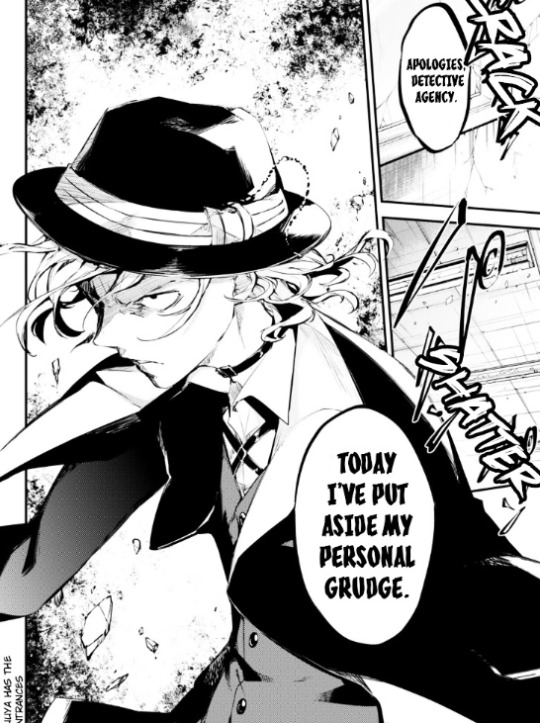
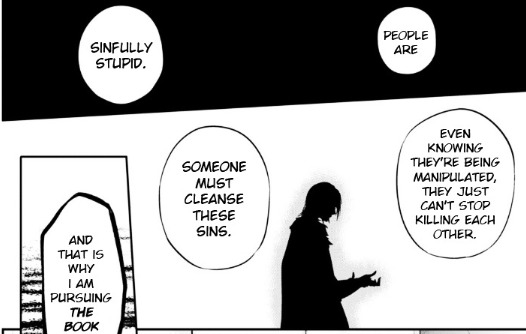
Ironically Chuuya’s behavior is exactly what Fyodor refers to as a “Sinfully stupid” human choice to make, because knowing he’s being manipulated he still chooses to kill the other organization head because it is his best bet to save the people he’s loyal to.
This is why we see Chuuya and Dazai in such opposite positions. Chuuya’s behavior just comes off as a lot more human than Dazai’s does. He genuinely believes in the human values that Dazai rejects. It’s most apparent in their relationship with Mori.
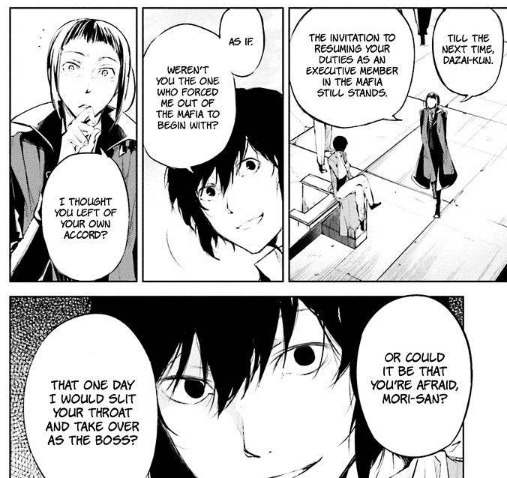
Dazai is someone who despite seeming like the same type of person as Mori, someone who only sees other people as tools to use for their own purposes sees through Mori. He knows the parts of Mori are selfish and only acting on his own desires rather than making decisions for the good of the organization as he claims.
Chuuya is someone who genuinely belives in Mori and follows his guidance. Chuuya and Dazai are such opposites that they even both reacted to their mentors in opposite ways. Chuuya someone mentored by Ozaki Koyo who despite all of her flaws sees her subordinates as human beings. She even eventually aids in Kyouka’s escape from the mafia once she realized she would be better off that way, and only tried to stop her from leaving because she believed Kyouka would hurt herself trying to escape to the light and failing the same way Koyo did in the past.
Chuuya while he does show a lot of infleunce from Koyo, he does treat everyone underneath him as human beings, he takes care of those people like they were his own, at the same time takes the opposite path as her. Chuuya has never once tried to leave the mafia and is uninterested in it. Part of him even loathes Dazai for leaving the mafia because it’s a betrayal against loyalty, which is the most important quality for Chuuya. At the same time unlike Koyo who once tried to escape the mafia, Chuuya believes that he, Akutagawa, everyone elseare better off in the mafia. He accepts the mafia because it gives guidance to the blank stretch of void that is his own life.
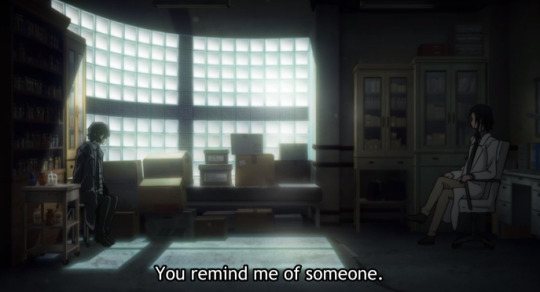
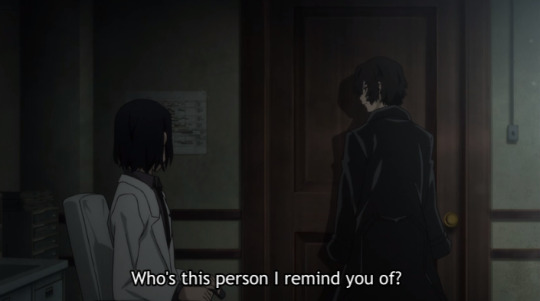
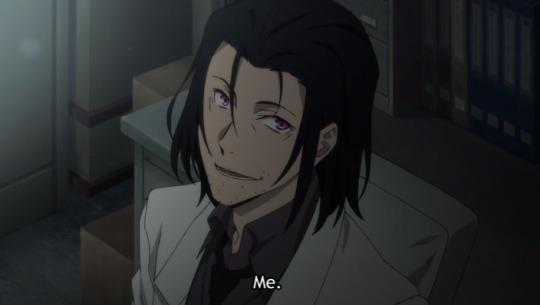
Dazai on the other hand, who Mori chose due to their similarities, and tried to manipulate by giving him a purpose and meaning to his life (the exact thing that Chuuya lets himself become a tool in order to have), ends up also choosing the opposite path of his mentor. Mori claims that he became the head of the Port Mafia for the sake of the city. Dazai however, leaves the Port Mafia fo his own personal development, so he can become a better person. The mafia’s values of loyalty, or their roles as the watchers of the night and the controllers of the dark side of the city mean almost nothing to him. Dazai sees through Mori. He refused to let himself be shaped into the right hand that Mori wanted him to become.
We also see a reversal of their situations. Dazai is now fighting to protect a small group of close allies in his organization, even though he manipulates them and orchestrates things in order to protect them. Chuuya is now practically Mori’s right hand man. To the point where he took over command of the mafia when Mori was put out of commission, and everyone accepted his temporary leadership. He took the place that Dazai was originally meant to occupy.
So their rivalry may just originate from the fact that they’ve chosen to take such opposite paths in life, that each one of them think is the absolute wrong path. Dazai thinks Chuuya’s value of loyalty and trust is just something that gets him used. Chuua thinks Dazai doesn’t have any trust and loyalty inside of himself at all.
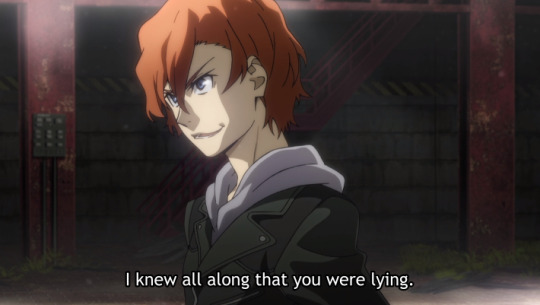
Their ways of thinking are also opposites. Dazai meticulously reads and analyzes everybody else around him, but he’s very untrusting of himself and lacks self reflection. Chuuya’s style of decision making and deduction requires him to trust in his own gut instinct and follow that through. Chuuya is someone very much aware of what his own values are, and what his thoughts ar, and follows those.
Chuuya seeks himself. Dazai denies himself.
The most frustrating part of all probably to each of them is that they do not want to acknowledge each other, they do not want to see the other as a human being.
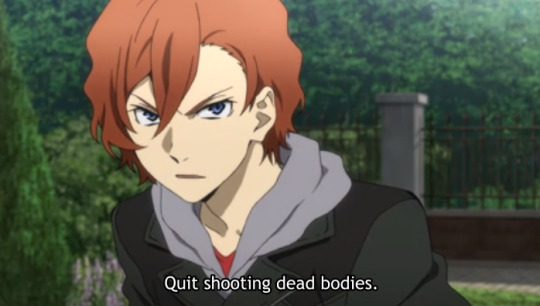
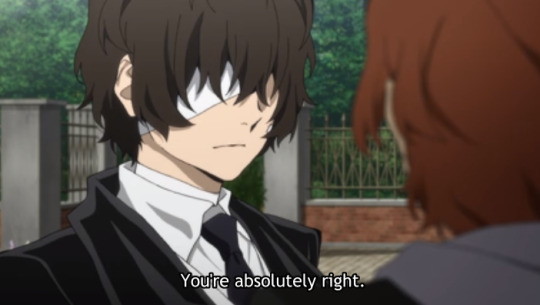
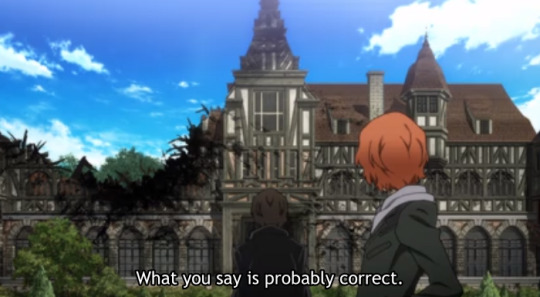
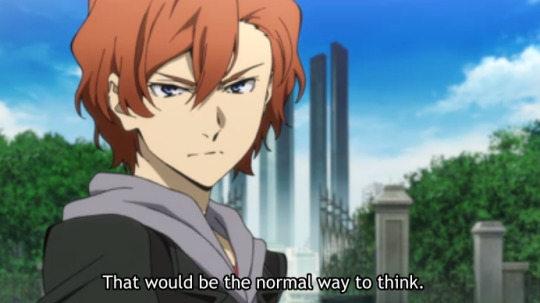
Part of Dazai’s conflict regarding Chuuya is probably jealousy. Chuuya despite being you know, pat god void monster whatever, is just a lot more normal than Dazai. He got along with other teenagers his own age. He shows no interest in death or dying. He acts like a normal teenager, bratty, rude, obsessed with looking cool. He is able to be normal in ways that Dazai isn’t, and therefore he is more qualified as a human being.
Whereas Dazai acts in a way that Chuuya is afraid of. Chuuya fears his own inhumanity, that his body does not really belong to him and he’s merely just possessing it. He fears that he’s empty on the inside and the way Dazai acts to him is how he assumes an empty person like him would act if he were not trying his best to belong among other human beings.
That is why both of them actively seek to dehumanize each other. Chuuya just wants to see Dazai as a suicide maniac who wants to kill himself for no reason. It’s easier to see him as someone who just wants to die rather than understanding his motivations for why.
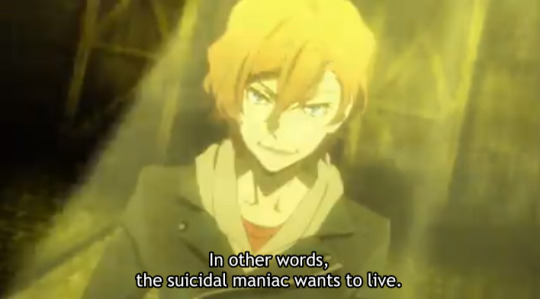
However, against his wishes Chuuya ends up coming to understand Dazai. Once he understands that Dazai is a person with his own motivations, it’s impossible to look away from him the way he previously did.
The same for Dazai, he wanted to reduce Chuua to being a dog. He wanted to deny Chuuya his own humanity, and make it easier for him to control. However, in the end Chuuya always refuses to be his dog. Chuuya is someone who asserts his own humanity to Dazai at every step of the way in a way that Dazai cannot deny. He won’t let Dazai see him as anything other than a human being. While older Dazai may be more mature and does not want to completely control other people the same way fifteen year old Dazai did, the fact that Chuuya is so undeniably his own person in a way that Dazai struggles with seeing other people as people is probably still something that irks him.
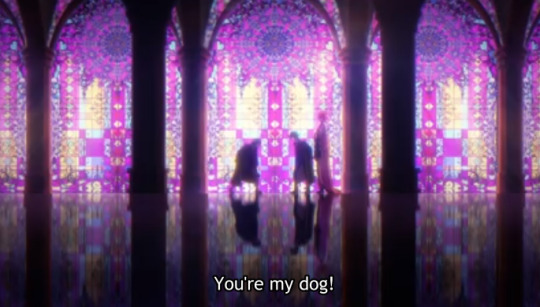
In the end, Chuuya and Dazai despise each other because they understand each other. They hate each other because they can’t hate each other. They see themselves as inhuman monsters, but they see the others weaknesses so well that the other is undeniably human in their eyes.
Dazai and Chuuya are both people trying to find meaning to their existence as human beings, and trying to know themselves. However, as Rimbaud already pointed out both of their desires are equally futile because there was no meaning in the first place. Nobody finds meaning in their existence. Everyone, all creatures, live without knowing who they truly are the same way Chuuya and Dazai do.
Rather than trying to find meaning in their own existence that they are never going to find, what both of them need to do is find acceptance of that fact. They are human beings, precisely because the two of them are such human failures.
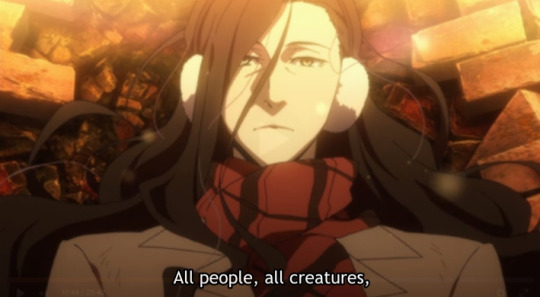
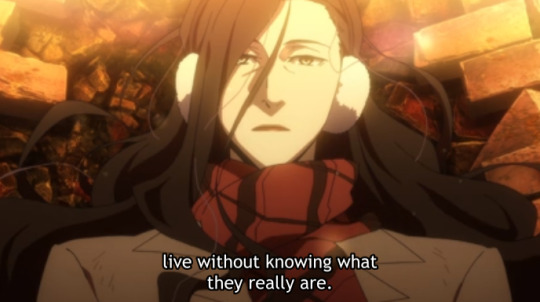
#dazai osamu#osamu dazai#bsd meta#bungo stray dogs meta#bungo stray dogs theory#chuuya meta#dazai meta#chuuya nakahara#nakahara chuuya#meta
1K notes
·
View notes
Text
“Insufficient Data”
I wrote this as part of a slightly longer fic, Raise a Glass, which was a just-post-Rise of Skywalker scene in which Lando, Chewbacca, Wedge, and Artoo reflect on the fact that they have all survived for so long in a galaxy that appears to have a really sick sense of humor; however, I think the Artoo part works as a standalone story, so I’m reposting it here because it’s my personal mission to make everyone around me as sad as possible.
Insufficient Data
R2-D2 didn’t consider himself something that could be ‘owned,’ but there were several people who he considered himself close enough to that it was roughly equivalent, or at least an easy enough claim to make to anyone who wanted to actually take ownership of him.
There were systems, subroutines, and a complex system of programming and reformatting (some of it self-designed) which provided him with what might be termed ‘purpose,’ but a droid wasn’t made to be in isolation. It was made to connect, to interact, and to accomplish things in cooperation with organic and other inorganic beings.
The connections that Artoo had left after all this time felt insufficient.
It was not a comfortable feeling.
His memory banks contained gaps—not from memory wipes, but from a lack of data. Things happened around him without context, and his ability to infer or calculate the missing pieces was limited, even though he had long ago surpassed the limits of his original programming.
Artoo’s original programming was straightforward: take what is broken and fix it.
He had done so on a Naboo ship, where he was the sole survivor of the astromechs that had been dispatched to repair the shields during the Queen’s escape from the Trade Federation blockade. It was that commendation—that survival—which altered his original directives to a degree that was likely not anticipated by his creators. He formed connections with the Queen herself, several Jedi, a protocol droid who would later become his dearest friend, and the little boy who treated Artoo like a person.
They all went to war together and Artoo connected with hundreds of clone soldiers and a Jedi Padawan who was barely taller than him when they first met.
But then something changed. Actually, a lot of things changed.
Artoo’s core purpose was to take broken things and fix them, but he could not fix Anakin; something had gone terribly wrong in his friend’s programming and he began acting in ways that were completely different from his original parameters. Artoo had not noticed the errors in time—and the cause, if there was one (and there must be one), was not one that Artoo could determine.
Insufficient data.
Then Anakin damaged Padmé and Artoo could not fix her either. He was not a medical droid but he knew enough from the war to know that her damage could theoretically be repaired with the appropriate tools. But, somehow, it had not worked; the GH-7 droid claimed that Padmé had experienced an internal error that caused an unexpected shutdown, but Artoo did not know the cause (and there must have been one) of that either.
Insufficient data.
There was nothing in Artoo’s programming that qualified as ‘anger’ but he came very close to experiencing it when Senator Organa gave C-3P0—Artoo’s friend—a memory wipe. A casual comment, an afterthought really, was all it took for his friend to be erased. Any information about how Anakin’s programming or Padmé’s functioning could have been altered vanished along with Threepio’s memories.
Insufficient data.
Artoo spent the next nineteen years watching over his friend, trying to recreate what had been lost.
He also spent the time watching over Leia, who was the next-generation model of Padmé and Anakin, for any signs of faulty programming or design flaws. He did not know why the other model had been taken away, nor did he know why Senator Organa had not provided Leia with the information about her parents. Artoo wanted to ask the Senator, but the knowledge of what had been done to Threepio was enough to deter him from making the attempt.
Insufficient data.
Then Leia sent him and Threepio to Tatooine, where they met Luke (the other model of Padmé and Anakin), and Artoo learned that Luke did not know about his parents or his sister, nor did he know about Kenobi, who had been right there on Tatooine the entire time.
Insufficient data.
And when Kenobi pretended not to recognize him, Artoo decided to wait until he could have a moment alone with the Jedi Master and then he would find out the reason.
But Anakin, who had acquired a different exterior casing since Artoo saw him last, killed Kenobi on the Death Star, and Artoo’s questions were unanswered.
Insufficient data.
Yoda pretended not to recognize Artoo as well, to the point that Artoo began to wonder if the entire Jedi Order had received a memory wipe along with Threepio.
The lack of useful data nearly got Luke killed several times, but Artoo did not know what to tell him because he didn’t understand why no one else had told Luke. Without context, it was impossible to calculate the risk: what if there was something in the data that had caused the faults in Anakin’s programming?
Insufficient data.
Eventually, the broken things were fixed, mostly by Luke and Leia. Then Leia and Captain Solo produced a next-generation model of their own, and Artoo found himself with more connections than he had possessed in decades. He traveled with Luke and retrieved all sorts of information that had been lost over the years.
But then things changed—and again, it was because Artoo had not noticed that something was wrong and did not know how to fix it.
Insufficient data.
Ben (the next-generation model of Leia and Captain Solo) had acquired the same programming errors as Anakin, erased the information that Artoo and Luke had compiled, and then left to do all sorts of things that were against Ben’s original parameters.
In response, Luke just… left. He went somewhere and left Artoo behind, and the map to find him was incomplete.
Insufficient data.
So, even though Threepio was still there and Leia was still there, Artoo decided to leave as well. He powered down and waited for something else to change.
Which they did: newer models of droids and newer models of Rebels came to replace the old ones, battles were lost and battles were won, and the First Order became obsolete just like the Empire did.
And, like before, things were lost in the process: Luke, back after so long away, ceased to function; Leia, who watched over Artoo for so many years, ceased to function as well; Captain Solo was damaged beyond repair, as was Ben. Threepio was almost lost, but Artoo had learned one lesson, at least: he kept a backup of his friend’s memory, just in case it was needed.
Artoo knew that, eventually, he himself would reach a point of obsolescence where he would no longer be able to function, but until then, he would not spend his time in isolation. He would form new connections, repair what had been broken, and pass along what he had learned.
#star wars#star wars fanfic#fanfic#by me#star wars sequel trilogy#star wars sequel fic#rise of skywalker spoilers#r2d2#artoo detoo
5 notes
·
View notes
Text
Disco Elysium (2019) - A Review and Analysis
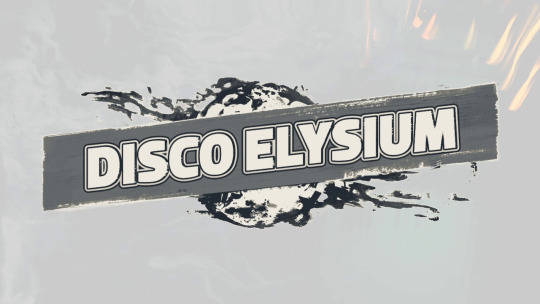
A postmodern role-playing game for a much different audience. A combination of skillful artistry and unfulfilled potential. An attempt at tackling difficult topics and pandering to different tastes. A full package, with deceptive contents...
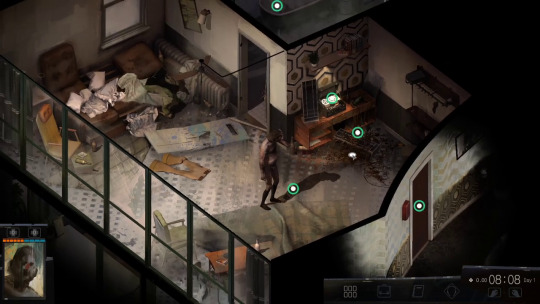
I enjoyed playing through Disco Elysium, but for completely different reasons than those that initially sold the game to me. Going in, I believed that it would be the type of RPG that I had been looking for quite some time – one that is not burdened by most of its interaction with the world happening on a grid, scanning through a list of spells and abilities, franticly pausing every frame, trying to min-max numbers as to not get destroyed by a pack of menacing farm animals of a slightly higher level. Examples of that in the genre would be classics such as Baldur’s Gate or newer re-iterations like Divinity: Original Sin and Shadowrun: Hong Kong. What I would habitually find myself doing is picking up the game, sinking my teeth into it, eventually hitting a numerical roadblock in some quest, and almost immediately retiring to a life of “not playing that game ever again”, as I am faced with the option of either save scumming and beating my head against the numeric wall, until by some fluke of the numbers I get the “good” number and am allowed to proceed; or could just stop doing whatever thing I am currently invested in and go somewhere else on the map, where the numbers are not as disagreeable, so I can get my personal numbers high enough to where the numbers I was having difficulty with before seem less impressive and I can pick up that quest again, but this time only halfway through, struggling to remember contextual cues that were relevant perhaps a few hours ago, but are now a forgotten footnote in some journal entry.
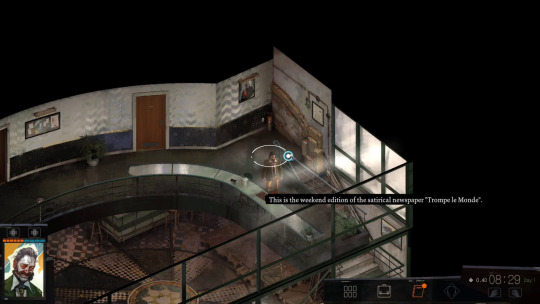
In both cases, the immersion gives way to the idea of gameplay, as the perhaps flawed ideal of an RPG is that which is based on table-top role playing games, such as Dungeons & Dragons, the aforementioned Shadowrun, or anything else that follows the same formula. From my personal experience in TTRPGs, the same issue persists, namely in having meaningful choice and character development take second fiddle to massive 3-5-man 1-2-hour combat encounters in between the more immersive moments of dialogue between players, non-player characters or story development. I’ve always felt that combat is so abstracted from everything else in TTRPGs in the way that it suddenly shifts into an entirely different game, which unlike the elements of role-play is less free-form and bound to a rigid set of rules. You’re no longer interested in how things look, feel or act, but rather how large a number is on a sheet of paper; and this contention of mine seems to always be translated into the video game counterpart of this genre, carrying the same problem from one medium to the other. Games even seem to compound upon the issue, by putting you in charge of multiple characters, where your custom created character is somehow not only equal to them, but at the same time the savior of the universe and all that is holy.
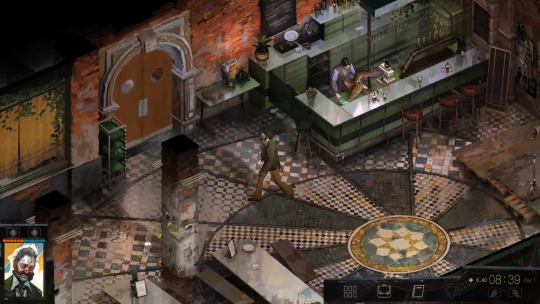
I cannot help but believe that the party ought to be AI controlled pawns, considering that they are supposedly different people with their own goals and aspirations; thus leaving the player to micro-manage their singular character – their avatar in the game world, rather than developing a form of psychogenic schizophrenia by having to deal with each and every one of the party’s members (now, admittedly the remakes of both Baldur’s Gate games have such a feature, but the combat AI is so poor, that you still have to go and remind them that they actually have a whole list of spells that they could be, in fact, using to… for instance, heal you, as you sit there bleeding profusely, crippled and powerless on the ground).
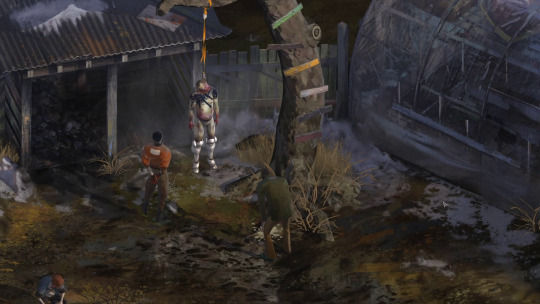
The only games which I have seen managing combat and RPG elements successfully are listed as a fundamentally different genre, known as “immersive sim” or “0451 games”. To name a few, that would be games like those of the Deus Ex, Dishonored and even the Fallout series. Most of those are first-person, for the most part shooters, with some emphasis on a singular character’s development through dialogue and stat point distribution. My main point can roughly be exemplified by comparing the naming convention and the reality for both genres: one is a “role-playing game”, the other is an “immersive simulation”; the first being used deceptively, as you could be playing a multitude of roles at any given time and also suspending that role-play to participate in some rather lengthy tactical combat for what could be 50% of the game’s runtime. On the other hand, you have “immersive sim”, which according to Warren Spector (game designer of Deus Ex and Thief fame) is a game in which “you are there, [and] nothing stands between you and [the] belief that you're in an alternate world”. I simply cannot emphasize enough how even the most engaging narrative and the most skillful writing can be tarnished by this type of abstract combat, which feels so fundamentally foreign and somehow still intrinsic to the idea of role-playing games and immersion.
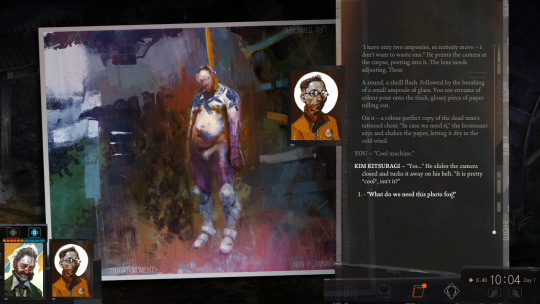
Disco Elysium seemed to be the odd one out – a RPG that has no combat, except that, initiated by your choices in dialogue (more akin to playing an animation than actual combat). It was also advertised to me as having quite an in-depth ideological system, that was affected by your choices in-game and would automatically adapt dialogue according to your flavor of politics, philosophy or culture through a series of thoughts, which you would internalize, if used often enough. Frankly, it seemed like wish fulfilment for a jaded immersion-loving straight-edge centrist such as myself.
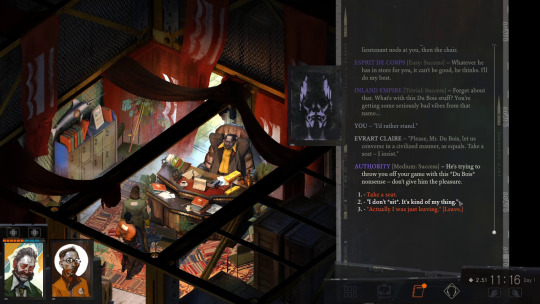
Upon launching the game, I was quickly introduced to the persona that I would be inhabiting – a deranged, drunken amnesiac, who in some cases would pass as a cop, but only if one’s notion of law-abiding is that of a drug-fueled abusive lover; also known as - the farthest thing from me. I already knew that my journey through the game would be that of a redemption arc, where this horrible piece of shit human, was going to become the most squeaky-clean, drug- and alcohol-free centrist known to all of Revachol. A true test of the game’s systems in action – from deranged and corrupt, to the straight and narrow. To my eventual surprise - I could do all of it, and very successfully at that. By the end of my nearly 24-hour playthrough, I had achieved my ideal vision for the character, with only a bit of resistance, which I will briefly mention further down the line. For now, I had succeeded in using all the tools available to me in order to internalize the thoughts for centrism, rejecting any form of drugs, and by the end almost managing to squeeze in the time to internalize being sober, cut short due to the spontaneous conclusion of the game.
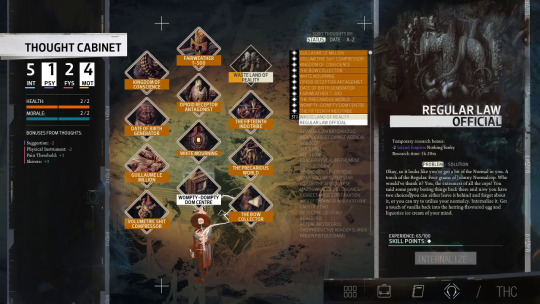
The thoughts system was not entirely what I had initially imagined. Namely, what I had envisioned was a system, which converts whatever responses one made throughout the game, into non-internalized thoughts, which would begin to alter the dialogue options available, and only after choosing to emphasize said options, would it eventually internalize and give you a lot more radical options based on said thought. What it would turn out to do instead is make the acquisition of thoughts work in a similar manner, but make the process of internalization a menu, in which you “equip” thoughts into available slots. It seems like a minor inconvenience, but it makes the thoughts feel like yet another item that you just set and forget, rather than the thoughts of a person being actively developed over time, based on what kind of discourse they engage in. I suppose the idea of having it take anywhere from thirty minutes to six hours to internalize is there to be the substitute for the drawn out process of internalization. It is in a way saying “I feel like turning into a centrist in the next thirty minutes.”, while going around doing investigative work around a crime scene. The more active process I envisioned, would indeed take a lot longer, but it would be massively more immersive, as more and more options become available to you over time, rather than after some arbitrary timer has gone down.
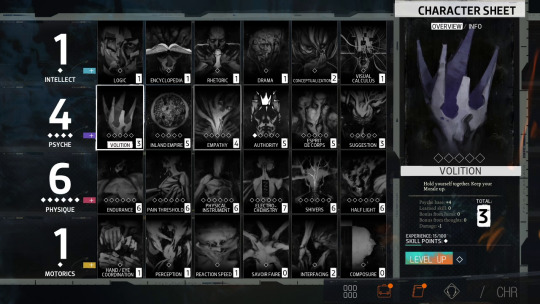
Another big detractor is having to use skill points to unlock new slots for thoughts, which would otherwise be put into your more practical skills. Theoretically, one would think a human has an almost infinite capacity for new ideas; and one is surely not going to want to internalize them all. A good example would be the “Volumetric Shit Compressor” thought you gain early into the game, which mainly fulfils its purpose in one skill check for less physically able characters as a part of a single quest and is never made use of again, beyond its flat stat bonuses. No other thought in my playthrough had a temporary pragmatic function like that, which feels like a missed opportunity. Its temporary nature is where the skill-point cost seems absurd, when they could be better used to improve one’s skills. In what way would the character becoming more skillful help them stop “getting their shit together”? Wouldn’t one discard the though immediately after it’s no longer useful? The way the system works currently, meant that I spent most of my points on slots and playing around with thoughts, rather than improving my character until the very last parts of the game, which in effect made the game more difficult than intended. The decision to make thoughts equipable and not persistent passive perks that can upgrade into more radical or complete versions of themselves is perhaps one of my main disappointments with the game. The effect on scope would be minimal, as the game already has the dialogue options for those thoughts written and would only need to change their acquisition and internalization to be less menu-driven and more player-driven.
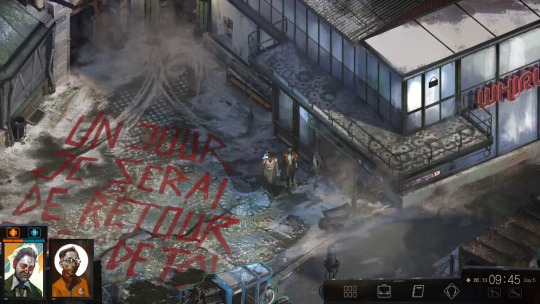
I tangentially mentioned not having skill-points to freely use until the latter parts of the game: That in turn made skill checks a lot more difficult and perilous, by making white skill checks (ones you can fail and retry upon increasing the skill they require) harder to re-unlock once failed and making red checks (ones that you cannot retry once failed) almost impossible, if not clothed in every stat-boosting piece of apparel in one’s inventory or seasoned with every potentially hazardous bottle of booze or glowing fairy dust left lying on the ground. White checks also do not unlock after one has used a consumable item or changed a piece of clothing to boost said stat, which encourages save scumming, as there is no way to change clothing in the middle of dialogue or knowing what the skill check will be, leading to one of the many pitfalls which I described earlier.
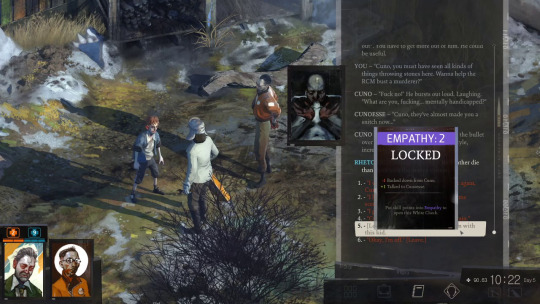
An even greater fault is that some quests just drop dead in their tracks, if the stat check is not completed. Moreover, since one cannot be proficient in all four skill categories, I would regularly hit a brick wall, upon being faced with a Psyche or Physique skill check, as my character mainly specialized in Intellect and Motorics. The thing about hitting a brick wall in Disco Elysium is not so much that you fail and have to face the consequences, but rather cannot continue at all and the narrative stops dead in its tracks until you can succeed the check. Sometimes quests are tied to each other, so not being able to progress in one of them means that you can’t progress in any of them. Suddenly an entire quest chain can just be gone at the click of a button. It got to a point where I would prefer to hear that all my efforts were in vain, fucking everything up irreversibly, rather than having a white check get locked and sit there in my journal, waiting for me to miraculously gain five points in some sub-skill of Physique. One way to fix this would be to have more obfuscated red checks with uncertain odds that lead to failure states. At least that would be more immersive than the current offering, as one could live with the consequences, rather than be left guessing what it could have been if one had slightly higher skills. This, however, could be difficult, as there is a dice roll to every skill. Not being skilled merely means you have less of a chance of succeeding or, alternatively, a higher chance to fail and lock the skill check.
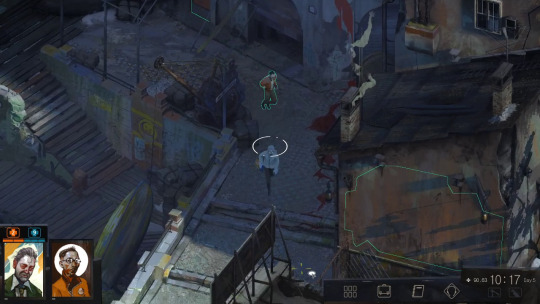
The one thing that the game does great when it comes to skills is the addition of secret tasks. If one were to follow particular lines of inquiry, they often lead to some skill check down the line becoming easier, due to the things learned beforehand about that topic. This system rewards being thorough and attentive and is, perhaps, the best feature of the game. However, observations made through the “shivers” system (where orbs of information will show up contextually above the protagonist’s head, revealing information about the environment or elaborating on something relevant) do not appear to factor into these skill checks. This often leads to you reading something important when it pops up in the overworld, but upon engaging someone in conversation one must often select benign lines of dialogue, acting like one hadn’t made those observations to begin with. The dissonance is even more infuriating whenever Kim (your companion throughout the game) tells you that you are obviously wrong, because he also made those observations but (unlike you) could talk about them. It would have been a lot more diegetic if there were dialogue options available for you to repeat the observation to Kim instead, perhaps as you talk to him in the overworld (a feature that is woefully underutilized, and shows the same five or so options throughout the entire game, except whenever Kim wants to talk to you about something he deems relevant – an ability, which you would think the player should have had as well).
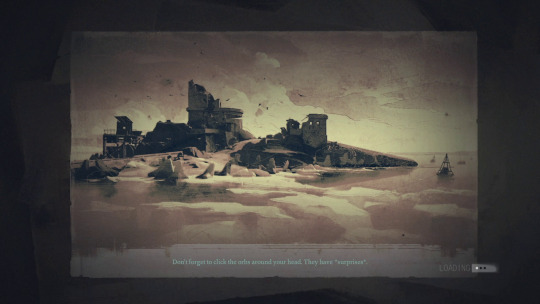
Speaking of the overworld, Disco Elysium does quite a lot with the small real-estate it has on its map. For what feels like a small neighborhood, it packs tens of hours of content, a varied cast of characters and lots of places to explore. Walking around is encouraged by the game, almost to a fault. At many points during the game Kim will remark upon your seemingly absurd ability to run around without getting tired. There even comes a point where you are injured, and are told not to run to avoid further harming yourself. After about twenty hours I realized that this was in order to signal to the player that if they run all over the place, trying to finish everything as quick as possible, they would be left with a lot of extra time at the end of the day, which would have been perhaps better spent looking into side-quests or other optional activities. However, the walk speed is woefully slow and with the amount of backtracking one needs to do, means that you will be seeing the same places plenty of times, which only tempts you even more to not waste your precious time RP-walking. The game has benches, which you can use to pass the time, but they are only available whenever Kim is not with you, which is only durring the night, meaning you can’t make any meaningful progress by resting on one, effectively making them worthless. That and the presence of time-gated tasks, means you will most likely be trying to find ways to waste your time, prompting Kim to berate you even more for straying away from the main focus of the narrative, as he often does. If you’re a fast reader, the game luckily fast-forwards time based on how many options you’ve selected, rather than real-time. This is most apparent whenever you’re save scumming and going though entire trees of dialogue you’ve already read.
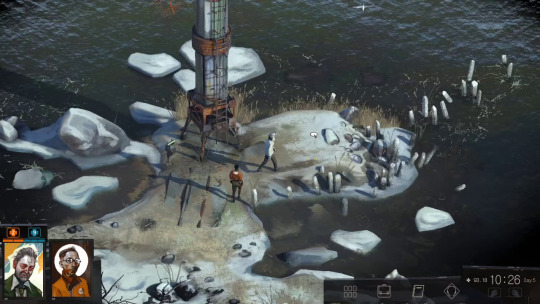
And you will be reading a lot, as this is what you signed up for when you relinquished the combat systems of your typical RPGs. A welcome change, I might add, as the dialogue is beautifully written and engaging for tens of hours. (The end credits even thank Chris Avellone for what is probably him lending a bit of his Midas touch when it comes to game writing.) However, there are of course flaws in the way Disco Elysium decides to portray some of its characters, as it is sometimes more interested in making political statements in a very one-note way that might shock some people, rather than what one would think are nuanced and fleshed out personas. A large part of the cast is wearing a thick layer of existentialism, which they seem to flaunt upon every given opportunity. The same goes for characters who clearly exhibit some variety of political radicalism; you’ve got your racist nationalist, your bourgeois-eating communist, your fence-sitting centrist (dubbed moralist) and a whole swath of colorful opinionated people whom you either interact with or endure. Everyone else is mostly pleasant to be around, if not a bit saddening, due to the overall melancholic way of life people of Disco Elysium are forced to lead, influenced by factors that they alone cannot control; an overall sense of futility present at every turn. Most of them have quirks that help them cope with their predicament, which you can explore in full detail through in-depth dialogue trees, leading to some intriguing interactions and ultimately some interesting consequences down the line. Every line of dialogue seems to have a lot of those, which is surprising for a game that so haphazardly makes you select dumb questions for answers you already know. An example of that is the one occasion in which I used a particular brand of alcohol to boost my “Pain Threshold” in order to open a certain mission-critical freezer. Which towards the end had Kim labeling me as someone who “drinks on the job”, even after becoming sober and internalizing the thought that removes all positive effects from alcohol, as well as the action leading to us retrieving an item, which we would later use to further the plot. Instead as a one-off sacrifice of one’s principles, it was seen as a major transgression that would only lead people into thinking of me as even more of a raging alcoholic, rather than someone who is trying to recover and “get their shit together”, as it were.
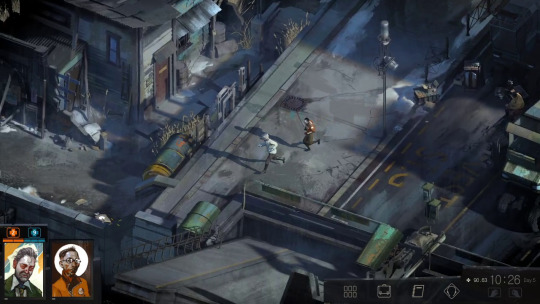
A major part of the game’s rhetoric is lost to those who do not have a dictionary that has been well tempered through copious forms of political jargon, coming from a various selection of manifestos, academic political analyses and some of the more famous philosophical works for the last century. I would go as far to say that some of the sentiments the game presents are absolutely impenetrable when it comes to wording. I’ll give you an example:
Heartache is powerful, but democracy is *subtle*. Incrementally, you begin to notice a change in the weather. When it snows, the flakes are softer when they stick to your worry-worn forehead. When it rains, the rain is warmer. Democracy is coming to the Administrative Region. The ideals of Dolorian humanism are reinstating themselves. How can they not? These are the ideals of the Coalition and the Moralist International. Those guys are signal blue. And they're not only good -- they're also powerful. What will it be like, once their nuanced plans have been realized?
If you immediately recognized that it was about centrism, then congratulations – you are a lot smarter than me and probably everyone else around you. For you Disco Elysium is the perfect college-level textual experience for your Tuesday-night 1960’s poetry club. For the rest of humanity, it’s a bunch of gibberish. Flowery prose and poetics are riddled everywhere and you're never really sure what you're doing, what thoughts you're thinking or what's happening to you.
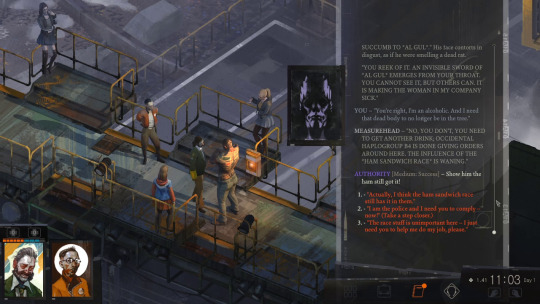
I mentioned briefly that the game tries to depict centrism as a form of moralism (a term which it prefers over the former). Even so, it presents centrism as less of an effort to hold multiple perspectives and act with a full and informed range of understanding, but rather as the stereotypical “fence-sitting” argument, where no decision can be made now, and progress can only be obtained through a slow, incremental process. While on the surface, it would seem so – as a self-proclaimed and passionate centrist, I cannot help but disagree with the outsider view that the game seems to be promoting, favoring critique of the right and an emphasis towards the left side of the political compass (making small but insignificant jabs towards both throughout). Contextually, the game’s developers Studio ZA/UM, have displayed a clear favor of the political left in their public appearances, which may explain this somewhat skewed perspective. While it’d be lovely to go on about the politics of ideology, it’s better not judge the contents of the game based on the developers’ ideological affiliation, but rather on its own merits.
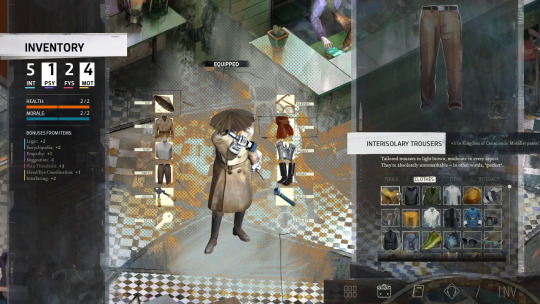
Considering the amount of reading one needs to do, I would hesitantly say that Disco Elysium is part RPG, part choose-your-own-adventure visual novel. I say RPG, because of the aforementioned brick walls, inhibiting progress in a way that no immersive sim ever would, as there would be multiple ways to get the same information, which is sadly not a thing Disco Elysium does well. The sheer volume of the text is also a cause for some, I would suppose, aesthetic concerns about the game. Graphically, the game is stunning with its unique painterly style, but it often values it over function, namely in having the UI serve little to no purpose, as Kim and your portraits take up the entire bottom left of the screen. At the same time the dialogue panel is put on the far right side of the screen, even though two thirds of it are spent zoomed in on some 3D models doing their idle animations, instead of having the text front and center, as the thing you will be most likely looking at for 90% of your time with the game. Other technical issues include shadows being displaced from where they should be, especially on stairs, as well as being incredibly jagged for a game that doesn’t really have high hardware requirements and very little real-time lighting, but all of this is frankly unintrusive, compared to the cramps in your neck from looking to your right all the time.
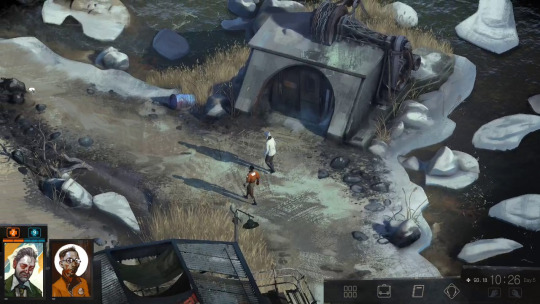
Every once in a while, you get to enjoy not having to read, as a select few scenes are entirely voice-acted by a talented cast. I am unsure, however, of the production team behind the recordings, as they seem to sound as if recorded in home studios with different microphones and sound processors. Other than that, the quality and range of the performances is wonderful, especially since it is coming from some lesser known actors in the industry.
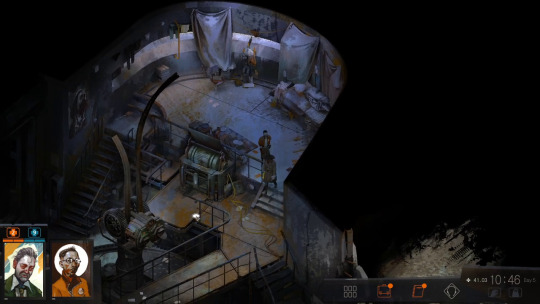
When it comes to sound, the game does a fantastic job of establishing a lot of varied soundscapes for an admittedly small plot of land. The music is ambient, droning and subtle in all the ways that make you not think about it, until you are sitting there listening to the soundtrack on your own time, remembering all the scenes that every piece of music has lifted from monotony. All of the tracks have this aging, somber tone to them, much like the world they are written for, making the music an unavoidable essential part of the experience, as you walk the fields of Revachol with the wind blowing and the small creek near you emitting a slight babble. The only downside is that the mixing of all these layers is often horribly unproportioned. Everything will be quiet, until some random intercom plays two straight minutes of loud white noise into your ear. Those parts are few and far between, but still leave a surprisingly large impression for an otherwise spotless execution of foley and ambience.
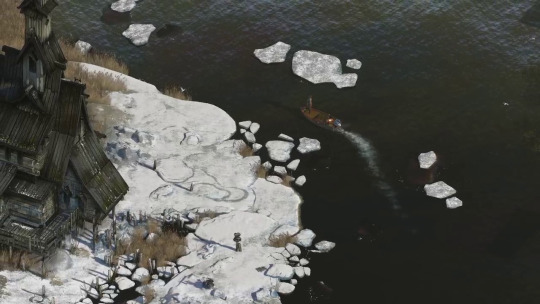
Overall, Disco Elysium is a full package. While not necessarily the game that I hoped it would be, it was still an enjoyable experience with an incredible main quest, memorable characters and side quests, elevated by wonderful sound design and fantastic ambient music, with writing that will be unparalleled for years to come. While it is not without its flaws, and some of them are quite major - it does what it set out to do with flying colors and is sure to appeal to a lot of people, who have been looking for an experience such as this. For me, however, it also represents a lot of squandered potential. It is by no means an ideal game – far from it; but I would still recommend you play through it for yourself, just to see where it takes you. It has a way of challenging you intellectually, that not a lot of games can pull off, especially nowadays. It is an admirable endeavor in tackling difficult topics, whilst also spinning an intriguing narrative that keeps you invested until the very end.
Score: 7/10
#game review#review#disco#elysium#disco elysium#harry du bois#kim kitsuragi#game analysis#game design#narrative#analysis#essay#revachol#oranje#politics#thoughts#systems#mechanics#game mechanics#RPG#visual novel#immersive sim#TTRPG#singleplayer#adventure#spoiler free#no spoilers
8 notes
·
View notes
Text
A Darkness So Bright
“Good morning, Amelie. Today is day 3,654.”
Amelie rolled over and buried her face in the pillow. One of the many problems she had with being on a space station equipped with a fully functioning artificial intelligence: she never got to decide when to wake up. There was no sleeping in in space, apparently.
“I thought I told you to stop reminding me of the days.”
“My apologies, Amelie. But today is a special day. I thought you would like to know.”
That was another problem, hearing a computerized yet just-feminine-enough-to-be-personable (or even more unnerving if you asked Amelie) voice tell you it had thoughts.
“Today is your ten year anniversary of first boarding Space Station Regalia,” continued Pyxi. It had a name, because of course it did.
Amelie pushed up onto her elbows and looked out the window. Ten years. The empty blackness of space stared back at her. The view from her window hadn’t changed in all that time, but still she had to check.
“My apologies, Amelie. I have not detected any planetary systems or traveling ships.”
“That’s okay, Pyxi.” Amelie stretched and got out of bed. “There’s nothing out here, and there’s never going to be.”
“Incorrect. We are out here.”
“If by we you mean me and a robot, then sure.”
“I am not a robot.”
“Pyxi, I know we’re friends and all because you’re literally the only one I can talk to, but you’re still a hunk of metal.”
“I am a space station.”
“And not a very good one at that.” The thing about stations — they’re not supposed to move. But when Regalia’s orbit stabilizers malfunctioned one day, it began to drift, if that’s what you want to call careening wildly in no direction except away at thousands of miles an hour. Once it was free of the planet’s gravity, there was no hope for it.
Another problem with artificial intelligence: humans don’t trust it. And a problem with human intelligence: it is inherently flawed. The station was designed with escape ships for all visitors and crew members, but the ships could only be controlled by humans (in case it was the artificial intelligence they were trying to escape from). Meaning Pyxi had no way of stopping the first panicking humans from taking off before everyone had been evacuated.
Which left a handful of people on Regalia with no way off. Luckily the station was self-sustaining and fully automated, so there was no need to worry about food, water, and power. Ten years and Amelie hadn’t even seen the station’s farm, which was probably for the best, given her track record with plants.
“I am as alive as you and the other visitors.”
Amelie stopped in her tracks just as she was about to open her door. “What did you say?”
“I am as alive as you and the other visitors.”
Except there were no other living visitors. Amelie was the only one left. A strange and swift illness claimed many of them about a year in. Depression and fear took the rest. As lone survivor, Amelie had had the pleasant job of putting many of their bodies in cold storage to preserve them as best she could. In case.
“What other visitors?”
“The same ones that have always been here.”
“The ones that died?”
“Correct.”
“And you are alive?”
“Correct.”
“And I am alive.”
“Correct.”
“But they are not alive.”
“Incorrect.”
“They’re dead. They can’t be alive.” Pyxi did not have an answer to that. “Are you detecting signs of life other than my own?”
A few moments passed as Pyxi scanned the station. “Negative.”
Even with that confirmation, Amelie couldn’t help the shiver of fear she felt as she opened her door. But the corridor beyond was empty, as it always was.
She headed towards the sick bay. “I don’t suppose there are any weapons lying around.”
“For the safety of our visitors, weapons are strictly prohibited on Space Station Regalia,” Pyxi recited.
“What if I needed a weapon for my safety?”
Pyxi took a moment. It always needed a little time to... think whenever the current situation didn’t line up with the station’s default programming. It hadn’t been prepared for a scenario like this one.
Neither of them had.
“There would normally be guards to deescalate any threat to visitors’ safety.” Normally being the operative word.
When she reached the sick bay, Amelie prayed to whoever would listen that there weren’t zombies on board the station. Then, she opened the doors.
A blast of freezing air rushed out into the hallway, chilling her. Slowly the lights blinked on.
The bodies were still there, lying under sheets just as Amelie had left them.
There were no zombies, because there was no such thing. Amelie felt a little foolish for even thinking it. She sealed the sick bay back up, leaving the dead to their rest. “Pyxi, are you feeling alright?”
“My diagnostics appear to be satisfactory. Why do you ask?”
“You told me dead people were alive.”
There was a pause. “It must have been a miscommunication. My programming expects visitors to be alive, but I understand that they are no longer. I will try to rectify this.”
“I’d appreciate it.” Amelie really didn’t need harrowing conversations like that one first thing in the morning. “There really aren’t any weapons on board? Even for the guards?”
“Not to my knowledge, but perhaps you may find something useful in the loading dock. Many tools can double as devices for protection.”
It was worth a shot. She had a feeling she would sleep a lot easier tonight with something blunt and heavy close to her bed. “How do I get there?”
A light overhead flickered. Then one to her left. Another farther down the corridor. She followed the flashing lights, Pyxi leading her to the dock. It was in an area of the station she hadn’t explored much, since there was little of interest to her.
She rounded one final corner and saw a door in the middle of the hall, the light above it fading in and out. As she approached the door, however, she heard a knock.
She stopped. Strained to figure out what direction it was coming from.
Another knock. It was coming from the door of the loading dock.
“Pyxi, is that you? Are you trying to unlock it?”
“Negative.”
A short burst of thumps. It was definitely the sound of a fist banging on the metal.
“And there’s no chance we’ve been miraculously found by a passing ship?”
“I have not detected any ships.”
The knocking was loud, demanding, constant.
“So, who’s knocking on the door?”
“No one.”
At that, the knocking stopped.
“Pyxi, do you mind running that scan for life signs one more time?”
“Sure thing.”
The lights in the corridor went out. All except the one blinking over the door to the loading dock.
“Pyxi?”
There was no answer.
A strange glow began to emanate from the loading dock, shining through the door’s window. Amelie inched closer. The light was unusual, certainly different from the fluorescence she was used to on the station. It was softer, warmer.
It was turning purple.
It bathed the corridor in a darkness so bright, a blackness of space that could be seen. She found herself moving closer to the door; she couldn’t help it.
She peered through the window.
Someone was looking back at her.
They stood there in a spacesuit, helmet still on, staring at the door. She couldn’t make out any features of their face. Only her own was reflected back to her in the glass of their helmet.
They stepped forward.
And knocked.
A sound loud and jarring enough to make Amelie jump back in shock.
The lights all came back to life at once. There was no one on the other side of the door anymore.
“Pyxi, what was that?” Amelie backed up against the wall. It was the only thing keeping her upright.
“Amelie.” Pyxi didn’t say anymore.
“Pyxi. What the hell just happened?!”
“Amelie?”
It was as if Pyxi couldn’t hear her, so she spoke louder. “Pyxi!”
“Amelie. What’s happening? Why are you screaming?”
“I’m not screa—”
“Amelie, talk to me. I don’t understand. I need you to stop screaming.”
“I’m not—”
There was a crackle as the intercom system came to life, then a piercing scream came through. It blared all over the ship at full volume. A terrified scream.
A dying scream.
It was Amelie’s voice.
“Turn it off!” She had to shout over the scream in hopes of being heard. “TURN IT OFF!”
The station returned to silence.
The only sound was Amelie’s heavy breathing as she tried to calm herself. “Pyxi, what the—”
“No life signs detected.”
“What?”
“My scan for life signs is complete. I did not find any.”
“That doesn’t— wait. Other than my own?”
“No life signs detected.”
“Pyxi, what does that mean?”
A pause. It was thinking.
“Amelie, are you there? I cannot detect any signs of life.”
But Amelie was no longer paying attention. She was looking at the window to the loading dock. A space helmet was staring back at her, not through the glass but in the reflection.
“My apologies, Amelie. I should not have reminded you of the day.”
#writeblr#creative writing#short story#horror#scifi#my writing#scary stuff IN SPACE#idk i just wanted to write a little something
17 notes
·
View notes
Text
Your eyes (part 2)
Part 1 here
Pairing: Reader (she/her) x Thane Krios
Disclaimer: I don’t own Mass Effect or its characters.
A/N: This will be a long one. I’m just verbose and love a slower burn. I have no idea how long this story will end up being, but hopefully I can finish it before my muse dies. I can tell she’s getting tired already.
----------------------------------------------------------------------------------------------------
She retreated to her room hastily after the encounter, and if she wasn't feeling sleepless before, now she was definitely sure she wasn't going to get even a minute of restful sleep. It was all so surreal and his words rang in her mind endlessly.
You intrigue me.
Sitting down onto her bed a heavy sight escaped her lips. She wanted to understand why Thane of all people would say something like this, and to her. Someone who was less than kind to him. He didn’t seem to be the kind of man who’d say such things easily. The thought of him messing with her did cross her mind, but he surely has much better things to do than to get back at her in such a juvenile manner.
The need to remember and analyze her interactions with the drell overwhelmed her. She must have missed something that led to this moment. Surely she has.
----------------------------------------------------------------------------------------------------
The last time they spoke was a few weeks ago, when he got word of what his son was about to do. The mission only required Shepard and Thane in the end, plus the cooperation of Captain Bailey and C-Sec, but she was still around while they gathered information on Kolyat's target and the person who ordered the hit. She was patiently listening from the sidelines, waiting for the pair to finish talking to Mouse.
She knew very little of Thane and his life. She never bothered to ask. ‘Assassins are not very complicated’, she thought. Meet contact, acquire target, fulfill contract by murder. Easy enough for someone who has the stomach to kill just about anyone regardless of their moral standing. Apparently, Thane was one such man and somehow that didn't make him appear in a more favorable light at all. Of course she was missing many of the pieces here. For example she never knew he had a son until yesterday. Someone was forgiving enough to love a man who kills without distinction if he's told to do so. The world was truly strange.
In hindsight her words seem awfully skewed now. Shepard had told her a few things about him since then, not that she cared to know any of it previously. It may have been better not to learn those things, but it was probably an attempt at trying to diffuse the situation by making her understand Thane's point of view a bit more. Not that it needed diffusing in the first place, it would never deteriorate further. She was done with that conversation, and with him. He was part of the team, and as such had to be tolerated, but that was the extent to what she could do for him. Nevertheless, Shepard, ever the peacekeeper, was relentless and in the end she learned certain things about him. Like how he was raised by the hanar and trained as an assassin from a young age, and how this was pretty much all he knew of the world around him. Seemed like an awfully meaningless life to her, having others make all the decisions for you as if you lacked free will, and being used as a tool. According to Shepard, Thane even referred to himself as such. It's hard to believe that anyone would think of living such a life as great honor. Senseless, all of it. Willingly giving away children to be trained as assassins, stripping them of the opportunity of a healthy and happy childhood. A fate like that can lead to no fully functional adult and Thane is a prime example of that. Life scars us all in different ways.
She knows these things now, but back then, at that moment when she first snapped at him, she didn't. These major differences in their culture flew right by her head and she never bothered to look deeper into why exactly Thane would do the things he had done. Perhaps it wouldn't have mattered anyway. Just because she knows, doesn't mean she has to accept it as well. It's just easier to understand now. But that day? That day when he admitted to abandoning his own son, who was now about to ruin his own life, Thane just looked like a dying coward with a filthy conscience, ready to save face. A man hopelessly scrambling to lighten his soul before the end. She thought his reasons were selfish and wanted to let him know how much of a hypocrite he was, how he failed to calculate the consequences of his negligence which culminated in this unfortunate situation. For the first time since joining the Normandy crew, she abandoned her cautious and reserved manner and let her words flow freely without filter. Words that were meant to tear at him. And she didn’t even understand why.
Shepard had just told him it was not his fault, and like a saint, he said he had to hold himself accountable. That was the last push, she couldn't stay silent any longer.
"How hypocritical of you. Leaving your son behind only to return now. Must have been one long journey finding that backbone." Her voice was low but bitter. She didn't want passersby to notice the conversation, but she wanted him to hear every word. Of course she wouldn't support his son's decision, but it was clear to her now where it was coming from. They never mentioned the possible motive during the debriefing on the shuttle, for good reason it seems.
"He faces a dark path." That much was evident, she wasn't debating it.
"If only he had a good example to follow, huh?" She felt her mood sink further as she faced him, and her tone mirrored that clearly. It was dripping with venom. And Shepard of all people told him just a few seconds ago how it wasn't his fault. There was no one left who was more at fault than Thane. No one.
"I left to protect him. To make sure that he would never be pursued by the people who killed his mother." A sound argument at first glance, but severely flawed at the second. At least he seemed to think it was the right choice, as his answer held a hint of resistance.
"You leaving isn't the biggest and only problem. It's the fact you never returned until now." Her jaw was clenched now and her eyes fixed on the male. His gaze was distant, almost as if a thick mist was obscuring his view. Perhaps she caught him off guard but his silence only angered her more and not waiting for a reply, she continued.
"Has it ever occurred to you that your son would have a different idea of why you left? Have you even stopped to think how it must have felt to him to lose not only a mother, but a father as well? Have you put so little faith in him that you've never considered returning to explain everything to him? You were fine leaving him in the dark all these years, but now that he's doing the only thing he can to understand you better, you decide to return!" Her voice was louder by the end than she would've liked, and she took a deep breath to calm herself. There was no need to draw too much attention to themselves. She wasn't even sure why she felt so affected, both Thane and his son were strangers to her. She couldn't even attach a face to the latter, as she's never met him. But here she was, getting worked up over something that wasn't even her concern.
She took one more breath and glanced at Shepard, half-expecting the Commander to step in and say something in Thane's favor like before. Instead she met Shepard's surprised eyes as they darted cautiously between Thane and her. There would be no fighting, no, Shepard didn't need to worry about that, but she would still bury Thane with her words. "It's almost as if the only reason you're here now is to clear your conscience."
"I wanted him to choose a different future, away from all the suffering I've caused. For him to live a better life than what I could have given him." His voice was almost too quiet to hear, his tone somber and remorseful. Her eyes met his once more.
"And so you decided to cause more suffering by leaving and never returning? So he could only guess why you left? Maybe even feel unwanted or responsible for it? You never gave him the chance to understand your reasons, you never asked him what he wanted and what would have made him happy. You weren't even there when he needed you the most! You hid like a gutless coward instead and would have died knowing that you were unworthy of being called a father!" There was little keeping her volume in check now as she hissed the last words, running out of breath as she finished.
The few concerned glances of the people around them made her snap out of her frenzy. Suddenly she felt more self-conscious than before. She glanced around uneasily before turning back to Thane one last time, careful not to be too loud this time.
"It may not be obvious to you, but it's certainly not rocket science either. Your son may have accidentally found the only way to successfully draw your attention to himself. Just think about how sad this is. Had he not decided to go through with this, you'd have never come here at all. It may not be his end goal to meet you, but I'm sure he hopes to gain an understanding of you at least. For his sake, I hope you can intervene in time and provide him solace. He deserved better."
There was nothing else she could or wanted to say. She felt drained of nearly all emotion, save for a drop of guilt. She didn't even know what she felt guilty for, it was certainly not for Thane. No. You reap what you sow, right? Right. She felt somewhat sorry for Shepard for having to witness this conversation, sure, but that wasn't it either. Perhaps it was the fact that she'd never shown so much of herself so publicly. A selfish reason, but who wants to make a fool of themselves in front of a crowd? Especially knowing how this whole issue had nothing to do with her. If only she managed to take her own advice and mind her business and stew about it alone, when no one was looking. She needed to leave. And right now. She looked up at Shepard, almost begging the Commander with her eyes to break the deafening silence and thankfully, Shepard delivered.
"Come on, we're wasting time. Let's go back to Bailey."
----------------------------------------------------------------------------------------------------
She spent the rest of the time sitting on a bench not too far from Bailey's office where Shepard and Thane conducted their impromptu interrogation. The waiting was killing her, sitting alone and overthinking her previous outburst wasn't proving very productive. She needed to sleep, or cry, or both. Anything to purge her system.
The pained expression of Thane also haunted her more than she'd like to admit. The man made many mistakes, and paid for most of them. Now it was a possibility that he'd lose the only thing left that he may have held dear to his heart. It really wasn't her place to lash out at him. Of course Shepard's coddling of him also rubbed her the wrong way, for more reasons than one. So, so selfish. The thought of ruining an innocent child's hopes and future still sent her fuming though. Why are children always the ones who have to suffer the most? It was never fair, never. They'd have to carry the burden, be molded by it and grow up with it. If they were lucky, they'd become healthy adults who'll know better than to inflict the same on their own children. If not, then regardless of the reason, they could be tempted to follow a bad example, like Kolyat.
She snapped out of her thoughts when she saw Shepard return, Thane and another drell, his son, being escorted behind her by Bailey and his men. She didn't even realize they moved on from the interrogation. Just how much time has passed?
Thane and Kolyat were led into a separate room, while Shepard and Bailey discussed whatever happened and may come next. She breathed a sigh of relief as her eyes met Shepard's. They were all alive and seemingly well at the very least.
Bailey and the Commander continued talking for what seemed like an agonizingly long time before Shepard joined her. She spoke before the Commander could.
"Reunited at last. Did it go well?"
"Better than expected. We arrived before Kolyat could fulfill the contract. Bailey offered to provide a room for the two of them to catch up and... sort things out. They've been in there for a while now, we'll leave once they're done."
She listened but was somehow still distracted by how easily Shepard could solve problems. Attempted assassination, finding a ship that was lost a decade ago and saving its surviving crew, infiltrating a known criminal's home to steal something, and the list goes on and on. It never ceased to amaze her how Shepard managed to succeed at nearly everything. No wonder people put so much hope into them. But the Hero of the Citadel was still just one soldier and no matter how solid someone is under fire, the pressure of defeating yet another great threat, possibly relating to the reapers, could break anyone regardless of strength, training or experience. It's hard to believe she was a skeptic first.
Time sure proved her wrong.
Realizing that she's been staring blankly out of her head without acknowledging what was said, she nodded. "That's good, they probably have a lot to talk about. And Thane must have a lot of explaining to do." She regretted saying that immediately, fearing that Shepard may misunderstand it. She didn't mean any harm with this statement, not this time at least.
Luckily, before any more could be said, Bailey waved the two of them over, signaling that the family reunion has just ended. They could get ready to leave now. At last.
A silent shuttle ride later they arrived back to the Normandy and departed the Citadel.
The day finally ended, and not a moment too soon.
---------------------------------------------------------------------------------------------------- ˘˘˘˘˘˘˘˘˘˘˘˘˘˘˘˘˘˘˘˘˘˘˘˘˘˘˘˘˘˘˘˘˘˘˘˘˘˘˘˘˘˘˘˘˘˘˘˘˘˘˘˘˘˘˘˘˘˘˘˘˘˘˘˘˘˘˘˘˘˘˘˘˘˘˘˘˘˘˘˘˘˘˘˘˘˘˘˘˘˘˘˘˘˘˘˘˘˘˘˘ ----------------------------------------------------------------------------------------------------
I contemplated posting this, I’m not very happy with it, but I don’t know how to rewrite it. Oh well :/
Also, I’m very passionate about parents fucking up their own children (my personal experience is probably coloring my perception on this topic) and it bothered me how we can’t really call Thane out on his shit. I wish we could.
13 notes
·
View notes
Note
Thanks for a great blog! Your words have helped me a lot, but there is one thing I am struggling to understand, so hope you can clarify. You often mention the importance of developing functions IN ORDER (e.g. as an INFP, I should develop Fi first, then Ne, Si and finally Te),and this makes sense in theory. In self-improvement terms, I have always tried to take the best approach for a situation and go outside my comfort zone to consciously work on skills and functions etc. (1 of ?).
[con’t: However, your advice implies a longer-term focus, and that working on a specific function is a good idea. If I understand, Te will NEVER feel as natural as Fi - like writing with your wrong hand could look nice however well it’s developed. My question is how do you know which function (of the 4 in your stack) you should currently be developing? How do you evaluate your strengths, and determine when the ‘next function’ needs development, and when would this change? You have also mentioned the negative impacts of developing functions in the WRONG ORDER. My upbringing, (and male environmental pressures) led me to suppress Fi growing up. Now I’m 32, I am reasonably balanced between my use of Fi and Te, but don’t think either of them are especially healthy in isolation. In contrast my Ne-Si feels unbalanced, and I consciously work on slowing my head down, and to stop skimming over details etc. So, on one level I feel like I should work on Si to bridge the gap to Te. However my Fi feels weaker than it should be, and while I can use Te in a positive way, I still feel like I should be more ‘effective’ in life. Sorry it was long, but theory without examples is hard for me. I am really interested in understanding more about developing functions IN ORDER, and the impact of developing in the WRONG ORDER, and how to undo damage, and where best to focus on for self-improvement. Thanks!!]
I commend your willingness to learn, because an open mind and a good attitude is half the battle. It seems you want something like step-by-step instructions, which is a reasonable request and common from Te types, but it can’t really be granted because it doesn’t fit with the reality of how the mind works. The mind is complicated and hard to understand, that’s why we’re often reduced to using metaphors or analogies.
When you read the guides, I make a point of saying that cognitive functions aren’t skills. They aren’t something that you can improve from 1 to 10 like learning piano. This analogy doesn’t properly represent the real-life process of type development. For example, if you equate Te with “organization skill”, then you are likely to believe that if you just learn how to organize better and practice it, then Te will be “well-developed”. No. This analogy does not account for the intention behind your desire to use and develop the function. Why is it that some INFPs are good at organizing, some even run corporations and manage large groups of people, but they still frequently experience Te grip?
You can work hard at developing Te as a “skill” all you want, and you’ll probably get better at doing your daily tasks and keeping everything running smoothly, that’s true - this is not a “bad” thing to do. However, ask yourself what really motivates your desire to build up Te in this way? If your desire stems from wanting to realize your positive potential and become a better person, i.e., self-love, then great. But if your desire actually stems from barely conscious feelings of inadequacy, self-abasement, shame, helplessness, or other negative emotions, then you probably haven’t realized that you’re in Te grip, despite whatever appearance you give off of having your life together.
Functions are tools for making sense of the world and making good decisions in life. How well you use these cognitive tools is not just a matter of skill (skill does help in small ways), it’s also a matter of whether you can properly DECODE what they’re telling you to do. Let’s say that Te is “telling you” to change careers because the career that you really want is not going to lead to great success and wealth. Should you listen? No amount of “organizing skill” is going to answer this question for you, right?
Think of it this way: All of your functions are speaking to you, so your job, like being “president”, is to know the right time to listen to the right function. What this implies is that developing your functions is not about particular skills, rather, it’s about how much self-awareness you possess when making choices. Let’s say Te tells you that: you suck when you’re not rich and famous, you need to sacrifice your integrity to make it, you have to grind yourself down to nothing to achieve the symbols of success, etc. Even if you satisfy these Te demands, are you going to end up as a person that you’ll be proud of? You listened to that Te, you got your shit together, you worked hard as Te told you to do, but would you call that “well-developed” Te or Te grip?
Why is self-development hard? Because you are filled with inner conflicts and you don’t know how to resolve them when you don’t have enough awareness of who you really are, what kind of person you should strive to be, what your deepest needs and concerns are, what kinds of desires are legitimate, what kind of life constitutes a “good” life. People are not objective and rational when they make decisions because the mind is a morass of conflicting information. We are all very easily influenced and led astray by unconscious activity, of which there are three common forms: 1) cognitive biases, usually faulty schemas or heuristics that mislead you about the reality of how the world works, 2) unresolved emotions, such as fear, shame, guilt, anger, pride, jealousy, etc, that twist and distort your perception and judgment, and 3) ego defense mechanisms that photoshop your self-image and blur your self-perception in order to escape the threat of low self-esteem (i.e. lying to yourself).
That’s why I emphasize self-awareness as the goal of function development. When you are unaware of your intention, or the why, behind developing a function, you are very likely to misuse that function because it’s not really under your control but actually controlled by your unconscious impulses. Can you see through the ways in which your functions give voice to your unconscious activity? Using the above example, can you see through those things that Te is saying? Can you understand that Te is speaking in that way to you because of shame or low self-esteem, not because it has “the right answer” about how you should live your life? In other words, when your mind is transparent to you, you will know when to listen to a function or not because you understand what it’s really trying to say to you.
WRT function order, generally speaking, you can’t use a function well until the functions before it have been developed well. To understand this concept, use a swimming analogy. The better you are at swimming, the deeper the water you can handle. If you can’t even handle the shallow side, you shouldn’t even think about venturing into the deep end. If you try to go deeper before you are ready, you’ll end up flailing wildly at best and drowning at worst. This is because the unconscious mind is layered and riddled with defense mechanisms, so you have to work your way through those layers gradually as you slowly increase self-awareness. If you try to develop a lower function before you have the necessary baseline level of self-awareness, you’ll just end up misusing that function because you aren’t yet capable of decoding its true message. Why? The lower the function in your stack, the more distorted that “voice” sounds to you because of its much closer proximity to your unconscious activity, especially your defense mechanisms and unresolved emotional issues.
The function order makes it seem like there is a linear path to take but it’s not so simple because there are two different issues: 1) How much knowledge you have about how to use a function well: This is important because you need something by which to measure your progress, and this is already explained in the Type Development Guide. 2) Whether you can use a function well in every circumstance: Life can be going very well for you circumstance-wise, in which case, your unconscious activity would be fairly quiet and your functions would naturally operate optimally. However, as soon as things don’t go well, you are likely to misuse all of your functions in a desperate attempt to cope with the stress. A function being higher in your stack means that you are less likely to misuse it simply because you are more experienced with it. But it doesn’t matter how “skilled” you are in using your functions if you are still misusing them the moment you get too stressed. For example, you could become great at organizing things (Te as “skill”) and yet, every time you’re stressed, you totally go overboard and get super controlling about everything -> you immediately get taken over by your unconscious unresolved emotions like fear and shame. This tells you that the most important overarching process of type development is learning from the mistakes you make and using that knowledge to boost self-awareness so that you can do better next time.
People often believe that they are more skilled than they are because their ego defense mechanisms prime them to think that way in order to preserve self-esteem. To address your unconscious activity requires radical self-honesty and not many people are ready for that. You have to possess a certain amount of genuine self-esteem to face up to all of your flaws and mistakes and learn from them. This can be especially hard for Fs because they are more sensitive to shame about feeling less than or incompetent. Long term type development involves a lot of growing pains because there is lots of fear and defensiveness to overcome. It’s not fun or pleasant to always be reflecting on the consequences of your actions and confronting all of the things you do wrong or badly. Not many people can face those pains and fears bravely, which is why they opt out. It’s hard to see through the growing pains to understand what enormous gains you can achieve by coming out the other side.
103 notes
·
View notes